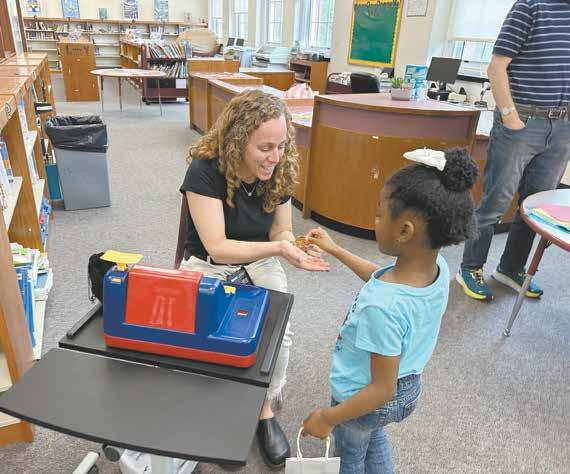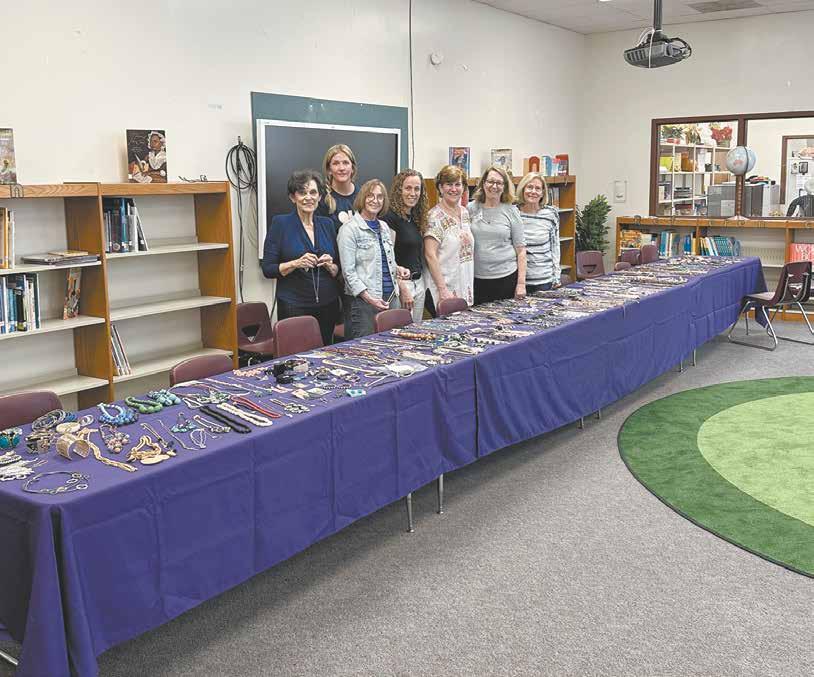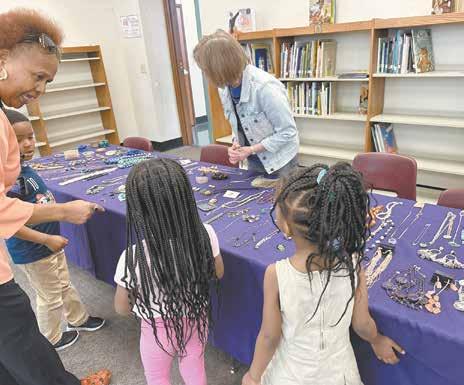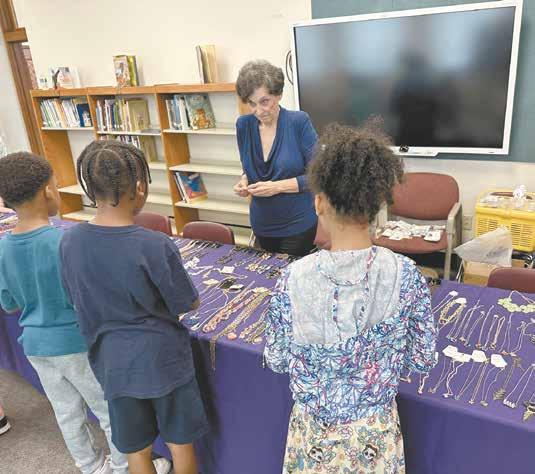improv improv






Jen Weinman was going through a really hard time in her life. She was dealing with depression and had a bad breakup. Then she met a group of people who had a common interest: improv theater.

“I asked them why they chose improv and one of them told me, ‘Because I wanted to participate in life instead of observe,’ ” said Weinman, 40. She joined and discovered a like-minded community.
Weinman is among a group of Jewish St. Louisans who are part of the local improv scene. Some people gravitate to improv to conquer a fear of public speaking; others do it to meet new people. It is both an affordable and approachable hobby with a welcoming community and
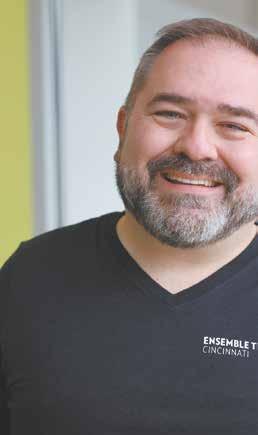
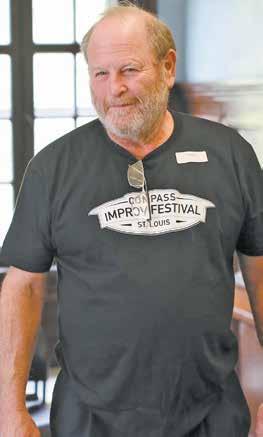

“It’s been a way to connect with other people,” she said. “Improv has changed all parts of my life in my family relationships, personal relationships, romantic relationships and professional relationships.”
Julie Bieniek Brown, who is preparing to teach high school, said improv helps enhance a person’s communications skills.
“I’ve never really had much of a fear of public speaking, but I know other people have,” said Brown, 41. “One of the guys that I used to see at the Improv Trick had
to give presentations to people that he worked with. It was just for a room with 10 people, and that made him terrified. So he learned improv. We were doing large shows, and he was up there doing it like it was nothing. So to go from being scared in front of just 10 people to doing a show for 1,000 people, I mean, that’s a huge feat.”
Improv is not a substitute for therapy, but it can be therapeutic, said Katy Paul, who works in human relations.
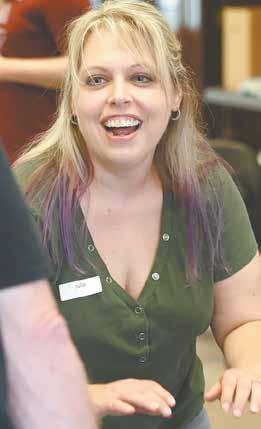
“I got involved in 2009,” said Paul, 38. “I had just gotten married. I was a year out of college, and I was looking for adult friends. I’d always done theater, and I had dabbled a little bit in improv. I took a class, and I was hooked and ended up being part of the first Improv Shop graduating class. And now I teach there, I perform regularly.
“It’s the only art form where everyone in the cast is the director. Everyone is a choreographer, everyone is the actor. We’re all doing it together at the same time. We are in the moment with the audience, sharing that experience live.”
We get to be silly and play pretend in a way that you don’t normally get to do in your adult life.”
The plot and narrative of an improv show can meander just about anywhere because the performers make it up as they go. On a recent weekend night at the Improv Shop in midtown St. Louis, Paul and Weinman were onstage being silly. One of the bits involved a Burger King employee receiving a critical quarterly review from her supervisor. The employee had a poor attendance record, and she brought her children to work, leaving them to chill in the walk-in cooler.
Growing up, Scott Weinberg watched a lot of Comedy Central and “Whose Line Is It Anyway?” As an adult, Weinberg, who works in information technology, began listening to improv podcasts.
“I had just gone on a real big health kick and had achieved a whole bunch of other goals,” said Weinberg, 42. “I wanted to put
For these comic actors, ‘improv’ also means ‘improvement’
The Newspaper of the Jewish Community of Greater St. Louis — Founded 1963
CONTACT US OUR BOARD AND STAFF
PHONE 314-743-3600
news@stljewishlight.org
MAILING ADDRESS
For payments
P.O. Box 790372, St. Louis, Mo. 63179-0372
For general correspondence please email news@stljewishlight.org

CONNECT WITH US
facebook.com/stljewishlight
TWITTER @stljewishlight
INSTAGRAM @stljewishlight
BOARD OF TRUSTEES
OFFICERS
Bethe Growe, President
Laura K. Silver, Immediate Past President
Laurie Chod, Vice President
Beth Manlin, Vice President
Ben Weiss, Vice President
Justin Krachmalnick, Treasurer
Debra Klevens, Secretary
Joan Silber
TRUSTEES
Dan Bindler, Jerry Ehrlich, Richard Flom, Mark
Gershenson, Caroline Goldenberg, Mia Kweskin, Debbie Lefton, Lauren Murov, Kara Newmark, Ryan Rich, Steve Rosenzweig, Bruce Sandweiss, Adam Schneider, Alan Spector, Todd Taylor, Dan Winograd

JEWISH LIGHT PAST PRESIDENTS
Milton I. Goldstein*, Morris Pearlmutter*
(founder), Morris Moscowitz*, Melvin
Newmark*, Rabbi Alvan D. Rubin*, Vivian
Zwick, Joseph Edlin*, Michael Newmark, Richard Stein, Yusef Hakimian*, Sanford
Weiss*, Philip Isserman*, Linda Kraus, Richard
Flom, Marvin Schneider, Barbara Langsam
Shuman, Terry Bloomberg, John Greenberg, David Grebler*, Milton Movitz*, Gianna
Jacobson, Jenny Wolkowitz, Gary Kodner, Jane
STAFF
EXECUTIVE
Betsy Schmidt, Chief Executive Officer
Ellen Futterman, Editor-in-Chief
Jordan Palmer, Chief Digital Content Officer
EDITORIAL
Robert A. Cohn, Editor-in-Chief Emeritus
Mike Sherwin, Managing Editor
BUSINESS AND ENGAGEMENT
Stacy Wolff Smart, Director of Business Development and Communications
Terri Green, Administrative Assistant
SALES
Angie Rosenberg, Senior Account Executive
Kelly Morris, Account Executive
Elaine Wernick, Account Executive
PRODUCTION
Erin Eason, Creative & Design Manager
CONTRIBUTING WRITERS
Shabbat begins
Friday, June 9: 8:07 p.m.
Shabbat ends
Saturday, June 10: 9:13 p.m.
Torah reading: Behaalotecha
Shabbat begins
Friday, June 16: 8:10 p.m.
Shabbat ends
BROUGHT TO YOU BY
#STLJEWISHLIGHT
Connect with us on all our social media using
Tzinberg Rubin, Steve Gallant, Laura K. Silver
* Of Blessed Memory
Bill Motchan, Amy Fenster Brown, Eric Berger, Patricia Corrigan, Barry Gilbert, Margi Lenga Kahn, Nancy Kranzberg, Elise Krug, Cate Marquis, Eric Mink, Judith Newmark, Martin Rochester
Saturday, June 17: 9:16 p.m.
Torah reading: Shlach
ShowMeChabad.com
The ST. LOUIS JEWISH LIGHT (ISSN 0036-2964) is published bimonthly by the St. Louis Jewish Light, Inc., a not-for-profit corporation, 7201 Delmar Blvd. Suite 201, St. Louis, MO 63130.

Periodical postage paid at St. Louis, MO. Copyright 2023.
Postmaster: Send address changes to the St. Louis Jewish Light: 7201 Delmar Blvd. #201, St. Louis, MO 63130.
The Jewish Light will publish print editions twice a month in 2023, on the following upcoming dates:
PUBLISHER'S STATEMENT PUBLICATION DATES FOR 2023 The
• June 21
• July 12 and 26
• Aug. 9 and 23
• Sept. 6 and 20
• Oct. 4 and 18
• Nov. 8 and 22
• Dec. 6 and 20
Father’s Day — like Mother’s Day — is one of those holidays that can change the way you celebrate it as you grow older. When we’re young, it’s about honoring dad for, well, being dad, and letting him know how important he is to us, how we appreciate him and how much we love him. (Yes, many father-daughter relationships are far more complex, but for the purpose of moving this story along, I’m simplifying.)
As we age, so do our dads, until sadly they are no longer around. Mine passed away nearly 23 years ago. Elsie SheminRoth, who is 94, lost her father 50 years ago. And Stacy Wolff Smart, 43, eulogized her dad under a hot Sunday sun at his funeral three weeks ago.
Recently, I sat down with Elsie and Stacy to talk about their dads, and in doing so, wound up feeling much closer to mine. What became even clearer after my conversations is how we choose to honor our fathers’ legacies, and neither Elsie nor Stacy nor me, for that matter, take that “how” lightly.

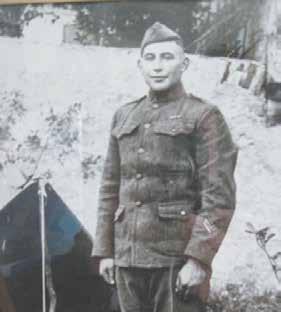
Elsie spent more than a decade determined to right what she felt was a terrible wrong done to her father, Army Sgt. William Shemin, as a result of his service during World War I. While he was awarded a Purple Heart as well as the nation’s second-highest military honor, the Distinguished Service Cross for “extraordinary heroism,” there was never any explanation as to why he didn’t receive the Medal of Honor — the nation’s highest military decoration of valor. Elsie and many others believe that he was initially overlooked for this award because he was Jewish, and antisemitism was rampant at the time.
The Jewish Light has written extensively about Elsie’s tireless efforts on her father’s behalf (to learn more, go to stljewishlight. org/shemin). Finally, in 2015, her work paid off when President Barack Obama presented Elsie and her sister a posthumous Medal of Honor for their father.

When I visited Elsie at her apartment in University City last week, she updated me on some of the tributes that keep pouring in as a result of his Medal of Honor.
Let’s see, she just learned that a street in a residential area of Fort Carson, a military base in Colorado, has been named Shemin Court in his honor. Also at Fort Carson: Plans to name a new fitness center after Sgt. Shemin, where a “Wall of Valor” inside the center will prominently depict heroes from the Army’s Infantry Division (where Shemin belonged). And in 2019, a community school in Bayonne, N.J. (where Sgt.
Shemin grew up), also was renamed for him.

Elsie raised five children, became a public health nurse at age 54 and then immersed herself in disaster assistance,
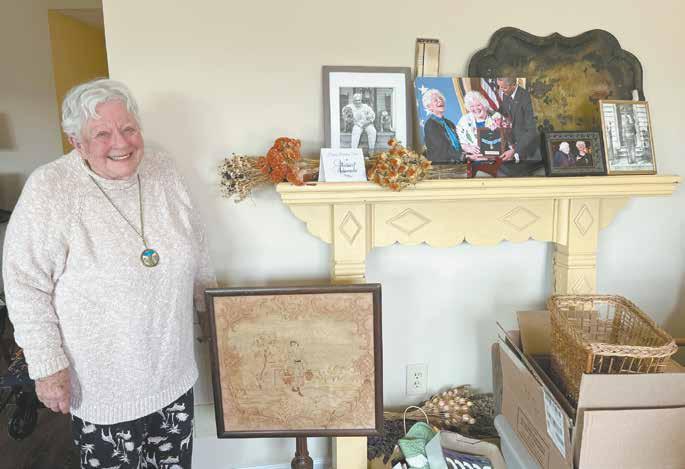

working at an immigration-absorption center in Israel following the 1985 airlift of Ethiopian Jews, tending to the injured at a trauma center in Tel Aviv during the Gulf War and helping Hadassah deliver 108 tons of medical supplies and clothing to Bosnia in 1995 and 1996. In other words, she is no slacker. At 94, she fiercely continues to pour her energy into causes that are important to her.
So where does this intensity and focus after nine decades come from? Her father, in part, she says.
“My father’s strength, which he imparted to his three children, was always doing a little more than asked. That is something we always tried to do, to go that extra step. That mattered to my father,” Elsie explained, adding that he also encouraged her to be independent and embrace her ambitions.
“He never saw the difference between what men and women could accomplish,”
 BY BILL MOTCHAN SPECIAL TO THE JEWISH LIGHT
BY BILL MOTCHAN SPECIAL TO THE JEWISH LIGHT

Gender identity and Judaism is the theme of an upcoming Bais Abraham Congregation summer speaker series.
Rabbi Micah Buck-Yael will discuss allyship as mitzvah on June 21, and Rabbi Garth Silberstein will explore Jewish law and transgender identity on July 22.
The series will feature Joy Ladin on June 28, when she will describe her experiences and how gender roles are changing. Ladin is a nationally recognized speaker on trans issues and Jewish identity after her transition at Yeshiva University made her the first openly transgender employee of an Orthodox Jewish institution. She recently gave the Jewish Light a preview of her upcoming talk.
What takeaways do you hope attendees will get from your Bais Abe presentation?
I’m hoping to help people learn to think and talk about this with one another instead of getting stuck in toxic silos of you’re either with us or against us. We need to lower the temperature of anxiety and create a space where we can negotiate over this. Everybody is a stakeholder in gender.
Do you find that some people are confused about, or have difficulty understanding the concept of being a trans person?
When I was growing up, there was no category for people like me. I thought I was the only one of my kind. It seemed like I was in aberration. It is very hard to understand people who are either male or female. While most people can be sorted into these two categories, there are also other ways of being human. Binary gender tells us that there are only two ways to be human, male or female, which is not true. The Talmud recognizes six different kinds of human bodies, including four that we would now call intersex.
What kind of familiarity did your students have with the trans community?
Most of my Orthodox students hadn’t even heard of trans people when I returned to teaching after my gender transition. As Orthodox Jews, they grew up learning to see human beings as being created in the image of G-d. So they would look past my gender and just treat me as human. And they know how to treat a human being. They knew that you treat
people with respect.
You’ve spoken about the fact that the Torah includes one genderless character and that’s G-d. Don’t a lot of Jews—and non-Jews—think of G-d as being male?
There’s a lot of patriarchal tradition that associates whatever is best, whatever is strongest, whatever is most powerful, whatever is smartest, with maleness. We think about G-d as the best, the strongest, the most understanding, and there’s a habit of thinking of G-d in male terms. But in the Torah, I don’t see any indication of that. Sometimes G-d is a fire in a bush. Sometimes G-d is speaking out of thunder. Sometimes G-d appears as three angels.
It’s not surprising that we relate to G-d in
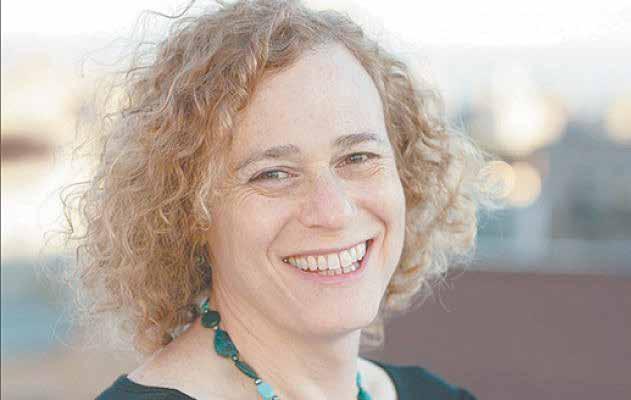
Abraham
Events are free, but registration requested at www.baisabe.com.

• Wednesday, June 21: Allyship As Mitzvah with Rabbi Micah Buck-Yael, 7 p.m. at Bais Abraham, 6910 Delmar Blvd.

Rabbi Micah Buck-Yael is Keshet's Director of Education & Training, where he supports organizations across the spectrum of Jewish life to build communities in which LGBTQ+ Jews and our families can thrive. As Coordinator of Community Chaplaincy with the Jewish Family & Children’s Service of St. Louis, Micah provided personalized support, connection, and meaningful programming for individuals throughout the St. Louis community. This session will cover basic tools for self-advocacy and allyship. Participants will learn how to identify common types of anti-trans bias and rhetoric, ways in which anti-trans bias and rhetoric may show up in interpersonal interactions, communities, and civil rights conversations, and develop skills to take action at both the interpersonal and the communal level. This is a live event taking place in person at Bais Abe.
• Wednesday, June 28: Ivrim, the people who pass over: What being Jewish can help us understand about gender and transgender identities, with Joy Ladin, 7 to 9 p.m.
See story at left for details. Although Ladin will be joining via Zoom, this is a live event taking place in person at Bais Abe.
• Saturday, July 22: Shabbat Lunch and Learn on Jewish law and transgender identity, with Rabbi Garth Silberstein
gender terms, but it’s dangerous when we project, when we think that G-d really is male or is female.
What is your assessment of states like Missouri, where the legislature recently passed two bills banning gender-affirming care for minors and restricting trans students’ ability to participate in sports?
There are a lot of people who are anxious about the way gender is changing and the way recognition of trans people is changing gender. Of course it freaks people out to think that that’s changing. These are profound fears, and they’re not driving the legislation, but the political operatives are taking advantage of anxieties over change and lack of knowledge of trans
As more and more Jews identify as transgender, and more and more transgender Jews choose to remain within the observant Jewish community, questions arise about how transgender Jews fit into the traditional gender categories when it comes to matters of Jewish law. In seeking to answer these questions, today's rabbis are able to draw on a rich tradition, going back thousands of years, of exploring cases that do not fit neatly or simply into existing legal categories, including the gender binary. Silberstein will explore some contemporary rabbinic thinking on this important topic over a light lunch immediately following Shabbat morning services.
people. There aren’t that many of us, so it’s easy to not know a trans person. We need to start addressing the anxieties. We need to be able to talk about what gender means to us, which means we need to be able to start talking about about our anxieties without being stigmatized.
Registration information on Ladin’s presentation is available at www.baisabe. com/event/JoyLadin

In early 2017 the St. Louis Art Museum (SLAM) began looking at ways to bridge societal gaps that were appearing around the city and the country. One idea was to turn their popular “Religion and Art” tour into something more meaningful that might foster deeper conversations. An accidental meeting gave them a place to start.
That summer, Amanda Thompson Rundahl, the St. Louis Art Museum’s Director of Learning and Engagement, happened to run into Batya AbramsonGoldstein. Abramson-Goldstein had just retired as the executive director of the St. Louis Jewish Community Relations Council (JCRC) and was then serving as chair of community programs at Arts and Faith St. Louis. After their meeting, museum staff and Arts and Faith board members began working on the idea of an interfaith tour collaboration. Soon, they connected with the Interfaith Partnership of Greater St. Louis and the “interfaith tours” were created.
The small group tours pair two diverse faith groups and are led by trained SLAM docents of different faiths. The tour is structured to demonstrate common elements of faith traditions in art produced through the ages.
“Docents identify a tour theme. Compassion, women in religion and the afterlife are examples of some past themes,” said Ann Murphy Burroughs, head of engagement and interpretation at SLAM. “The docents then select the specific works of art to feature on the tour.”
The tours quickly became popular but were suspended when the museum closed during the COVID-19 pandemic. Now, the interfaith tours are back.
“American art museums have unique opportunities in which to encourage mutual respect through interfaith dialogue. The tours highlight the important role that museums can play in exploring diverse points of view and in inspiring empathy and religious understanding,” said Murphy Burroughs.
To make sure each docent is fully knowledgeable of the art as well as the diverse religions that many of the tour participants represent, SLAM turned to David Oughton, a long-serving professor of world religion at St. Louis University.
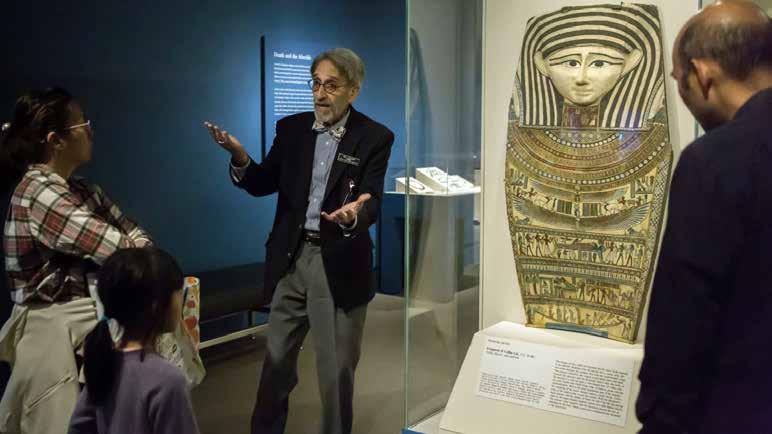
“Dr. Oughton provided specialized
in-gallery training as well as a ‘World Religions and Art’ PowerPoint for all SLAM docents,” said Murphy Burroughs.
“Since interfaith touring restarted, Dr. Oughton has provided multiple in-gallery refresher sessions for docents.”
The tours are organized by Kathy Bratkowski, development and publicity coordinator at Arts & Faith-St. Louis. Bratkowski looks to pair interested faith groups and handles the scheduling. The tours are available any time during regular museum hours.
“We have received great feedback from tour participants,” said Murphy
Burroughs.
In an email to Murphy Burroughs, a congregant from Temple Israel wrote, “We had a great time, and it was good to meet the folks from Salem Methodist Church.” In another email, a participant wrote, “The tour was amazing. It was a true interfaith group. Two Jews, two Christians, two (from the Baha faith) and one Muslim. Thanks so much for organizing!”
If you are interested in scheduling an interfaith tour, email Kathy Bratkowski, at kbratkowski@thesheldon.org

Rabbi Daniel Bogard, Mirowitz dad and spiritual leader at Central Reform Congregation, presented the Community Service Award to his rabbis and colleagues, Rabbi Susan Talve and Rabbi James Stone Goodman, whom he said have “changed the landscape of St. Louis Jewry, and have taught all of us what it means to be a mensch and justice
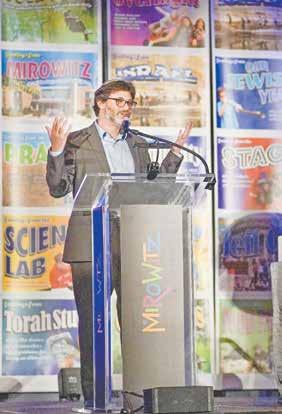
Each year, the Mirowitz family honors the memory of their patriarch, Saul Mirowitz (z’’l), who was among the founders of Mirowitz legacy school RJA. Mirowitz’s wife, Barbara (first row, second from left), is surrounded by her children, grandchildren, nieces and nephews.
More than 350 guests crowded the ballroom at the Ritz Carlton May 7 for “Greetings From Mirowitz” — the annual gala to benefit Saul Mirowitz Jewish Community School — and they left with something to write home about! The gala celebrated the impact of growing up with at Mirowitz, and featured a new video (see it online at https://bit.ly/Mirowitz-video connecting Mirowitz alumni with current students. The event raised nearly $300,000 for the school.
The school honored Buddy Lebman (seated at center) — a major force behind the creation of Mirowitz’s RJA legacy school — with the Meyer and Marcelle Kranzberg Visionary award. Lebman was also celebrating his 98th birthday, surrounded by children and grandchildren who traveled from Israel and Canada to be with him.

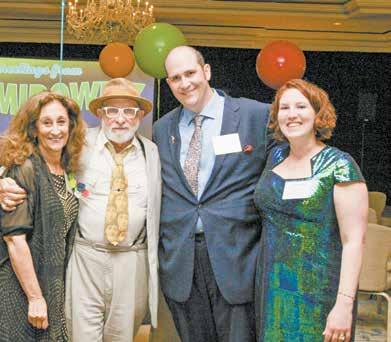
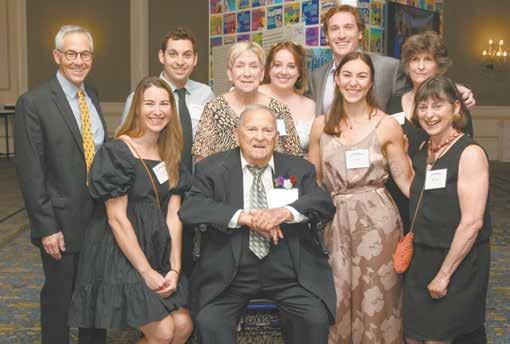
Mirowitz celebrated Rabbi Susan Talve and Rabbi James Stone Goodman, recipients of the Community Service Award. “They are beloved at Mirowitz for their devotion to our students, but they were honored for they way they live their lives as agents for social change and role models for Mirowitz students,” says Mirowitz Head of School Raquel Scharf-Anderson. Pictured here are Talve, Goodman and their children, Mirowitz parents Jake and Josie Talve-Goodman.
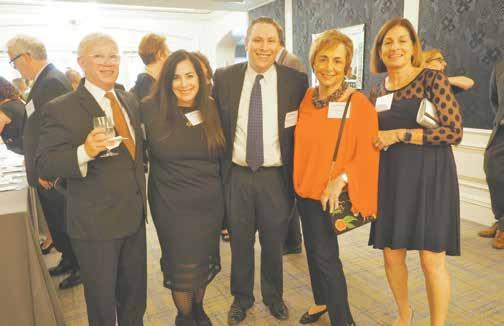

Mirowitz faculty and staff members: Susan Rimmerman, Suzanne Burak, Sarah Spencer, Alex Hoffman, Risa Shyers, Melissa Wachler, Gary Lerner, Emily Johnson, Elona Nice, Priscilla Calvird, Laura Johnson and Jerra Merrifield
Drs. David and Diane Rosen, president of the board. Jackson
The gala honored teachers and staff who are celebrating 5, 15 and 20 years at Mirowitz. Head of School Raquel Scharf-Anderson (at right) recognized (from left) Julie Abeles, 5 years; Leiba Levine, 20 years; Melissa Wachler, 5 years; and Patty Bloom, 15 years. Mark Conner, 5 years, was unable to attend.

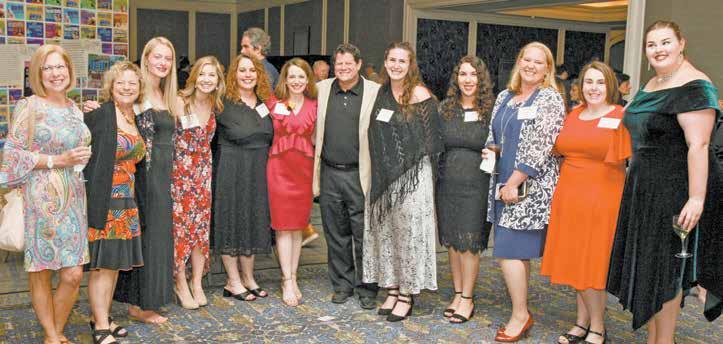

CONTINUED FROM PAGE 3
she said, explaining that she, her sister and her brother (now deceased) all worked equally hard at the family’s 5-acre nursery and greenhouse business in the Bronx, N.Y.

When she wasn’t married by 25 — “a shanda back then,” she jokes — it was her father who told her, “Wait for the right person. In the meantime, go out and do good things in the world.”
Stacy is still sorting through her emotions after the passing of her dad, Alan Wolff, at age 71, on May 15. He was a St. Louis native, owned an accounting firm and adored his family. When I asked what three words best describe him, she replied, “funny, caring and organized.”
Those pretty much would be the same three words I would use to describe Stacy, who is a colleague at the Light, and has become a friend. Actually, I’d substitute energetic for organized, not because she isn’t organized, but her boundless energy juggling work, family life and a seemingly endless string of volunteer jobs — while something to be admired — wears me out just watching it all.
While Stacy’s loss is still fresh, she says she’s realized much about her dad since his death.
“What I’ve learned in these short three weeks is that my dad impacted people in a positive way that I don’t think he even realized,” she said. “He always did the right thing, and he always helped people, whether it was through his business
where he’d go above and beyond or being the president of United Hebrew, or just offering simple acts of kindness. If I’m looking at how I would like to live my life it would be the way he did, which is to positively impact people and to always do the right thing.”

Do the right thing. That’s exactly what Elsie did when she embarked on years of tedious work, which eventually led to the William Shemin Jewish World War I Veterans Act, part of legislation signed by Obama in 2011. It established a review process for veterans who may have been
denied the Medal of Honor because of religion or race.
Stacy and I didn’t have war hero fathers — most of us do not — but our dads are still heroes because of how they inspire us. Positively impact people. Always go the extra step. And ringing in my ears from my dad, besides “nothing good ever happens after midnight,” is this pearl: “Do unto others the way you would want others to do unto you.” I bet you didn’t know my dad invented the Golden Rule.
My father had already passed away when I became editor of the Light 14½ years ago, though I believe he definitely had a hand in steering me toward the position. Growing up, I remember him attending minyan most mornings at our Conservative synagogue before he took the Long Island Railroad into New York City, where he worked as a salesman. Being part of a vibrant, local Jewish community gave him so much joy, comfort and connection. I think he hoped that as I got older, I would find that kind of solace, which to a large extent I have through the work that I do.

Even though they are no longer here, Elsie, Stacy and I — like many of you — carry a piece of our dads in our hearts, as their insights, their wisdom and the example they set help to inform our daily lives and keep their memory alive. So when Father’s Day comes on June 18, we will celebrate our dads the way we do every day of the year, by living the values they instilled in us.
And really, isn’t that what legacy is all about?
Through Labor Day, the St. Louis Kaplan Feldman Holocaust Museum is offering extended summer hours: The museum will be open 10 a.m. to 4:30 pm. WednesdayMonday. During the museum’s open hours, visitors will be able to explore the permanent Holocaust exhibition.
Additionally, beginning in June, the museum will offer museum educator-led tours on Sundays and Mondays. Visitors will be led on a guided tour of the Permanent Holocaust Exhibition by a trained museum educator. Upon the tour’s completion, visitors are welcome to explore the exhibition further on their own.
The tours will take place on Sundays and Mondays from 2 to 3:30 p.m. and have a maximum capacity of 20 visitors. Guests are encouraged to purchase tickets in advance — visit stlholocaustmuseum.org/ visit/tickets.




The Holocaust museum also announced its participation in Blue Star Museums, a collaboration among the National Endowment for the Arts, Blue Star Families, the Department of Defense and museums around the country. Between Memorial Day and Labor Day 2023, free admission to the museum is available to military personnel currently serving and their families.
This free admission program is available for those currently serving in the U.S. military – Army, Navy, Air Force, Marine Corps, Coast Guard, as well as members of the Reserves, National Guard, U.S. Public Health Commissioned Corps, NOAA Commissioned Corps – and up to five family members. Blue Star tickets must be acquired in person at the museum welcome desk. For more information, visit www.arts.gov/initiatives/blue-star-museums.
Newsmakers is a compilation of the Jewish community’s newsworthy professional and academic accomplishments. Submit your news to news@stljewishlight.org. Call 314-743-3669 for more information. Newsmakers is compiled by Elise Krug.
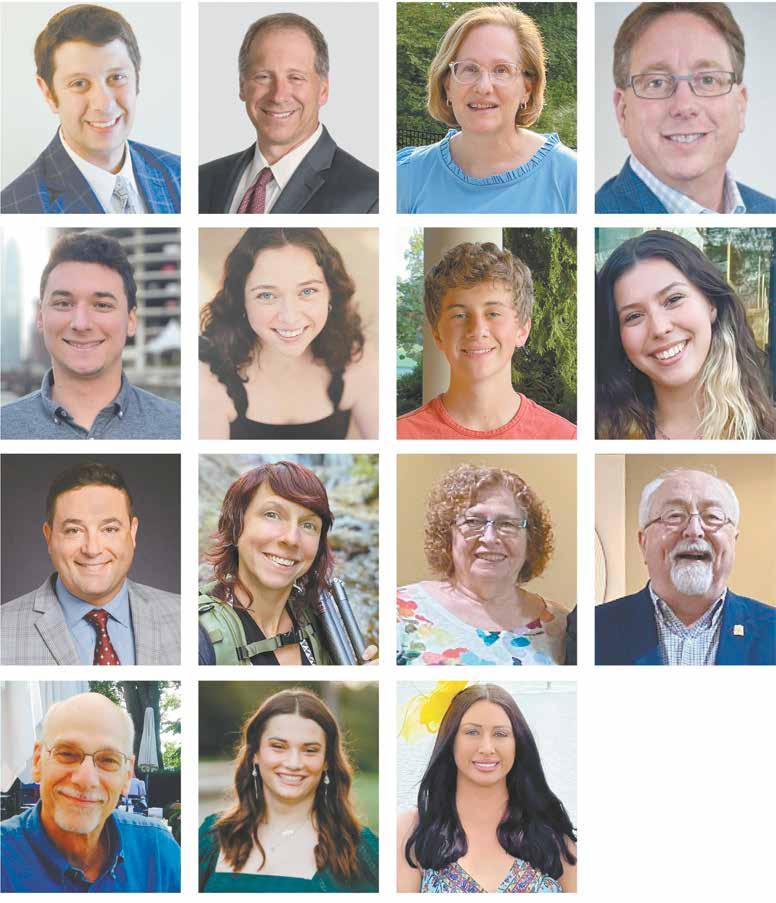
The presidency of several local boards has changed hands. Max Oppenheimer is the new president of Young Israel of St. Louis. Bill Remis assumed the leadership of Congregation Shaare Emeth’s board for a one-year term. Gail Feldstein heads up the B’nai Amoona board of trustees for two years. And the American Jewish Committee elected Mike Lefton as its president. Lefton is a member of Shaare Emeth.
Former St. Louisan Adam Schenberg is the new event coordinator of the Midwest CoE (Center of Excellence) for Jewish National Fund-USA, located in Chicago. He is responsible for helping plan fundraising and outreach events around the midwest region creating and executing their vision to raise money for Israel.

Allie Chervitz became president of Psi Chi Honors Society at Maryville University. A senior majoring in psychology/sociology, she and her family attend Shaare Emeth.
Mitchell Smith and Samara Landy of Congregation B’nai Amoona were elected to the Emtza Region USY board. Mitchell, son of Jennifer and Matt Smith, is the new president. He will be a senior at Parkway Central High School in the fall. Samara is the daughter of Jessica Landy and Michael Landy and is the vice president of communications. She will be a senior at Clayton High School and is in the dual enrollment program at St. Louis Community College.
Dr. Aaron Wahl was sworn in as a council member in Chesterfield’s Ward 2 for a second term. In addition to representing Ward 2, he was appointed to Chesterfield’s Finance & Administration committee and the Parks, Recreation & Arts committee. Wahl is the owner of Wahl Family Chiropractic in Chesterfield and is a member of United Hebrew Congregation.
“The Elder,” by photographer Neshama Roash, will be on display in the Roger Tory Peterson Institute in Jamestown, N.Y. for the Art that Matters to the Planet – Interconnectivity exhibit. Opening June 24 and on view through Oct. 8, the exhibit explores the underground network of tree roots, and how communication and nutrient sharing helps trees to thrive. Roash attends B’nai Amoona.
Bev Berla and Art Koenig were honored at the Gifted Resource Council’s 40th Anniversary Celebration for teach-
ing at least 20 years with the organization. The education agency was founded in 1983 to bring together the resources to support and enrich bright and talented children achieve their potential. Berla is one of the co-founders of GRC, was the executive director early on and retired from teaching last summer. Koenig has
BROUGHT
MONTH BY:
been teaching for about 26 years. Both attend Central Reform Congregation.
Paul Wagman received a National Headliner Award for his reporting in the Gateway Journalism Review on the roles played by various St. Louisans and people with St. Louis ties to the insurrection at
SECOND
THIRD ROW: Dr. Aaron Wahl, Neshama
FOURTH ROW: Paul Wagman, Ilana Boyer and Emily Laycob.
the Capitol. The bundle of eight stories were called “The Road to Jan. 6 ran through St. Louis.” Wagman placed third in the category of in-depth magazine writing about a major issue. He attends CRC. Ilana Boyer received the Whitfield
Continued on opposite page

School’s Peter Maack Ellis ’71 Senior of the Year Award, which is given to a senior who has been an outstanding school citizen, distinguishing themselves by leadership in extracurricular activities and involvement as a significant contributor to the St. Louis community. She also received the Upper School Spanish Award for her dedication to the language. Ilana, daughter of Marci and Marty Boyer and a B’nai Amoona member, will attend Elon University in the fall.

Emily Laycob has started Everything in its Place, a professional organization service. She offers in-home organization for any size project as well as weekly and bi-weekly maintenance services for kitchens to playrooms, closets to garages, attics to home offices and every space in between. For more information, search everythinginitsplace St Louis on Facebook.
The Ladue Horton Watkins High School boys’ varsity tennis team won the 2023 MSHSAA state championship for the second year in a row. Sawyer Bland and Amit Kadan are two of the 12 boys who made it happen. Sawyer is the son of Karen and Jeffrey Bland and will be a senior at Ladue in the fall. His family attends Shaare Emeth. Amit, son of Dafna and Ohad Kadan, will attend Washington University majoring in finance.
Yana Hotter accepted the position of executive assistant with the St. Louis Kaplan Feldman Holocaust Museum. Her main responsibilities are to support the museum executive
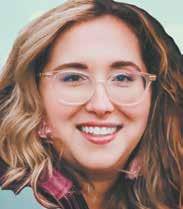



director, team, and board of directors with general office administration. Hotter will continue operating her company, Spoonful of Sugar Photography & Videography, on a limited basis, concentrating only on b’nai mitzvahs and weddings. She is a member of United Hebrew.
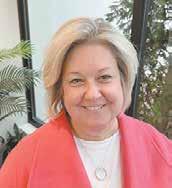
Abby Durlester has announced that her law firm, Propper Legal & Consulting, is open for business. It will offer modern, clear, and approachable contracts, and provide day-to-day strategies, branding support, and legal counseling for corporate and entertainment clients. Durlester attends Shaare Emeth.




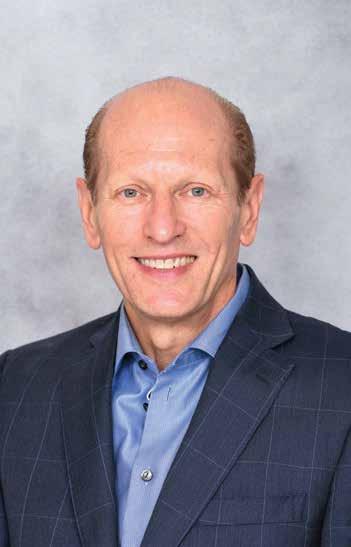
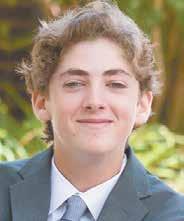
The Jewish Community Center welcomes three new members to their executive team: Nicole Hawkins, Chief Operations Officer; Tracy Bowler, director of marketing and communications; and Andy Berman, director of fitness and membership.
Hawkins comes to the J from the St. Louis Area Foodbank, where she served as vice president of community impact and innovation. She also spent time at AAIM Employers’ Association and the American Red Cross of Eastern Missouri. In her new role, Hawkins will support the J’s efforts to become more strategic in its working approach and will be instrumental in the transition to a new CEO in the coming months.
Bowler also spent time at the St. Louis Area Foodbank where she served in a similar capacity as director of marketing and communications. She also spent time in a similar role at Chaminade College Preparatory School and at Schnuck Markets, where she was vice president, marketing operations. In her new role, she will lead all marketing and communications initiatives for the J.
Berman will be responsibile for all membership sales and fitness operations. He has more than 26 years in the fitness industry, most recently in Atlanta at Iron Tribe. Although Berman is relocating, St. Louis is a familiar place to him as he lived here when serving as general manager of the Clayton location of Wellbridge Athletic Club.
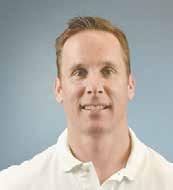
WASHINGTON — President Joe Biden unveiled a multifaceted and broad strategy to combat antisemitism in the United States that reaches from basketball courts to farming communities, from college campuses to police departments.
“We must say clearly and forcefully that antisemitism and all forms of hate and violence have no place in America,” Biden said in a prerecorded video. “Silence is complicity.”
The 60-page document and its list of more than 100 recommendations stretches across the government, requiring reforms in virtually every sector of the executive branch within a year. It was formulated after consultations with over a thousand experts, and covers a range of tactics, from increased security funding to a range of educational efforts.
The plan has been in the works since December, and the White House has consulted with large Jewish organizations throughout the process. The finished document embraces proposals that large Jewish organizations have long advocated, as well as initiatives that pleasantly surprised Jewish organizational leaders, most of whom praised it upon its release.
Among the proposals that Jewish leaders have called for were recommendations to streamline reporting of hate crimes across local, state and federal law enforcement agencies, which will enable the government to accurately assess the breadth of hate crimes. The proposal also recommends that Congress double the funds available to nonprofits for security measures, from $180 million to $360 million.
One proposal that, if enacted, could be particularly far-reaching — and controversial — is a call for Congress to pass “fundamental reforms” to a provision that shields social media platforms from liability for the content users post on their sites. The plan says social media companies should have a “zero tolerance policy for hate speech on their platforms.”
In addition, the plan calls for action in partnership with a range of government agencies and private entities. It says the government will work with professional sports leagues to educate fans about antisemitism and hold athletes accountable for it, following instances of antisemitic speech by figures such as NBA star Kyrie Irving or NFL player DeSean Jackson.
The government will also partner with rural museums and libraries to educate their visitors about Jewish heritage and antisemitism. And the plan includes
ADVERTISEMENT
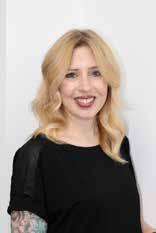
Are your dizzy spells or vertigo starting to limit what you’re able to do every day? Have you had to miss out on life because of these episodes? Are you so frustrated that you think your only option is to suffer through these spells every time you have them?
Maybe you’ve been told that being dizzy is a normal part of getting older and you just have to deal with it THIS IS
While dizziness is the most common reason people over the age of 70 go to see their physician every year, it is not a normal part of the aging process This means there are things you can do to decrease or completely eliminate your dizziness
I know so many older adults who have just accepted that their dizzy spells are now a normal part of their lives This does not have to be you!
Over the last 16 years, I’ve worked with hundreds of older adults who’ve suffered needlessly with dizziness and vertigo, and I've had the opportunity to help them get back on track


In working with so many seniors, I realized there is so much misinformation out there about dizziness and vertigo, which is why I created my Guide “How To Decrease Dizziness”
At HouseFit, we help adults 55+ maximize their independence and fitness, so they can continue to enjoy a full and active life
Second Gentleman Douglas Emhoff speaks about the Biden administration’s antisemitism strategy at the State Department on May 25.

actions to be taken by a number of cabinet departments, from the Department of Veterans Affairs to the USDA.
“It’s really producing a whole-of-government approach that stretches from what you might consider the obvious things like more [security] grants and more resources for the Justice Department and the FBI,” said Nathan Diament, the Washington director of the Orthodox Union. “But it stretches all the way across things that the Department of Labor and the Small Business Administration can do with regard to educating about antisemitism, that the National Endowment of the Humanities and the President’s Council on Sports and Fitness can do with regard to the institutions that they deal with.”
An array of Jewish organizations from the left to the center-right echoed those sentiments in welcoming the plan with enthusiasm, marking a change from recent weeks in which they had been split
over how the plan should define antisemitism. Still, a handful of right-wing groups blasted the strategy, saying that its chosen definition of antisemitism diluted the term.
Despite the relatively united front, there are elements of the strategy that may stoke broader controversy: Among a broad array of partner groups named in the plan is the Council on American-Islamic Relations, whose harsh criticism of Israel has led to relations with centrist Jewish organizations that are fraught at best. The call to place limits on social media platforms may also upset free speech advocates.
Biden recalled, as he often does, that he decided to run for president after President Donald Trump equivocated while condemning the neo-Nazis who organized a deadly march in Charlottesville, Va. in 2017.
“Repeated episodes of hate — including numerous attacks on Jewish Americans — have since followed Charlottesville, shaking our moral conscience as Americans and challenging the values for which we stand as a Nation,” Biden wrote in an introduction to the report.
The administration launched the initiative last December, after years during which Jewish groups and the FBI reported sharp spikes in antisemitic incidents. The strategy was originally planned for release at its Jewish American Heritage Month celebration last week, but was delayed, in part because of last minute internal squabbling over whether it would accept a definition of antisemitism that some on the left said chilled free speech on Israel. Some right-wing groups were deeply critical of the new strategy for not accepting that
Continued on opposite page
definition to the exclusion of others.
Rabbi Levi Shemtov, the executive vice president of American Friends of Lubavitch (Chabad) praised the breadth of the plan, and said the delay seemed to produce results.
“The White House has taken this very seriously. The phrase that something is still being worked on can often be a euphemism for a lack of concern,” he said. “In this case, it seems to have resulted in an even more comprehensive and hopefully more effective result.”
Some of the initiatives in the plan focus less on directly confronting antisemitism and more on promoting tolerance of and education about Jews.The Biden Administration will seek to ensure accommodations for Jewish religious observance, the accompanying fact sheet said, and “the Department of Agriculture will work to ensure equal access to all USDA feeding programs for USDA customers with religious dietary needs, including kosher and halal dietary needs.”
Jonathan Greenblatt, the AntiDefamation League CEO who was closely consulted on the strategy, said promoting inclusion was as critical as fighting antisemitism. “Is FEMA giving kosher provisions after disasters going to solve antisemitism?” he said in an interview. “No, but… it’s an acknowledgement of the plurality of communities and the need to treat Jewish people like you would any other minority community, and I think I’m very pleased to see that.”
In the months since Second Gentleman Doug Emhoff, who is Jewish, convened a roundtable to launch the initiative, the Biden administration has pivoted from focusing on the threat of antisemitism from the far-right to also highlighting its manifestation in other spheres — including amid anti-Israel activism on campuses and the targeting of visibly religious Jews in the northeast. Those factors were evident in the strategy.
“Some traditionally observant Jews, especially traditional Orthodox Jews, are victimized while walking down the street,” the strategy said in its introduction. “Jewish students and educators are targeted for derision and exclusion on college campuses, often because of their real or perceived views about the State of Israel.”
The proposal that may provoke controversy beyond American Jewry is the Biden Administration’s calls to reform the tech sector, which echo bipartisan recommendations to change Section 230, a provision of U.S. law that grants platforms immunity from being liable for the content users post. Free speech advocates and the companies themselves say that if the government were to police online speech, it would veer into censorship.
“Tech companies have a critical role to play and for that reason the strategy contains 10 separate calls to tech companies to establish a zero tolerance policy for hate speech on their platforms, to ensure that their algorithms do not pass along hate speech and extreme content to users and to listen more closely to Jewish groups to better understand how antisemitism manifests itself on their platforms,” Elizabeth Sherwood-Randall, Biden’s top Homeland Security adviser, said during a 30-minute briefing on the strategy on Thursday. “The president has also called on Congress to remove the special immunity for online platforms and to impose stronger transparency requirements in order to ensure that tech companies are removing content that violates their terms of service.”
In the weeks before the rollout, a debate raged online and behind the scenes amid Jewish organizations and activists about how the plan would define antisemitism. Centrist and right-wing groups pushed for the plan to embrace the International Holocaust Remembrance Alliance’s working definition. Among its examples of anti-Jewish bigotry are those focusing on when Israel criticism is antisemitic, including when “double standards” applied to Israel are antisemitic.
Advocates on the left say those clauses turn legitimate criticism of Israel into hate
speech; instead, they pushed to include references to the Nexus Document, a definition authored by academics that recognizes IHRA but seeks to complement it by further elucidating how anti-Israel expression may be antisemitic in some instances, and not in others. Others sought to include the Jerusalem Declaration on Antisemitism, which rejects IHRA’s Israelrelated examples.

In the end, the strategy said the U.S. government recognizes the IHRA definition as the “most prominent” and “appreciates the Nexus Document and notes other such efforts.”
A number of the centrist groups pressed for exclusive reference to IHRA, including the Conference of Presidents of Major American Jewish Organizations and the Simon Wiesenthal Center. Those groups praised the strategy and focused only on its embrace of IHRA. So did the Israeli ambassador to Washington, Michael Herzog.
“I would like to congratulate the Biden administration for publishing the first ever national strategy to combat antisemitism,” Herzog wrote on Twitter. “Thank you, @ POTUS, for prioritizing the need to confront antisemitism in all its forms. We welcome the re-embracing of @TheIHRA definition which is the gold standard definition of antisemitism.”
Some center-right groups like B’nai Brith International, StandWithUs and the World Jewish Congress, praised the strategy while expressing regret at the inclusion of Nexus. Right-wing groups, such as the Republican Jewish Coalition and Christians United for Israel condemned the rollout.
RJC said Biden “blew it” by not exclusively using the IHRA definition. The Brandeis Center, which defends pro-Israel groups and students on campus, said the “substance doesn’t measure up.”
Groups on the left, however, broadly praised the strategy. “We call on our Jewish communities to seize this historic moment and build on this new strategy to ensure that the fight for Jewish safety is a fight for a better and safer America for all,” said a statement from six left-leaning groups spearheaded by Jews For Racial & Economic Justice.
Greenblatt said it was predictable that groups on the left would take the win and that groups on the right would grumble — but that it was also beside the point. IHRA, he said, was now U.S. policy.
“This document elevates and advances IHRA as the way that U.S. policy will be formulated going forward and across all of the agencies,” Greenblatt said. “That is a win.”
Educators will engage with the state of Israel’s past, present and future at the 22nd annual Enrichment Workshop on Modern Israel, held online by the Center for Israel Education and the Emory University Institute for the Study of Modern Israel from July 23 to 25.
With the theme of “Israel@75: Challenges, Successes and a Look to the Future.” All participants will receive a package of resources for classroom use
The program is for Israel educators at Jewish day schools, synagogue schools, supplemental learning programs and adult education providers. The workshop also suits Jewish professionals whose organizations educate about Israel. Sessions will run from 11 a.m. to 3:30 p.m. ET every day and from 7 to 8:30 p.m. ET the first two days. The $150 application fee is waived for cohorts of three or more. Visit israeled. org/workshop for more information.
ABOUT THE OPINIONS SECTION
Viewpoints expressed in letters, commentaries, cartoons and other opinion pieces reflect those of the writer or artist, and not those of the Light. We welcome submissions of letters and commentaries to:
news@stljewishlight.org
Following my transfer to a new elementary school in the fourth grade, I was offered the opportunity to play a musical instrument. Music had always been a huge part of my life, whether in synagogue, which I attended each Shabbat morning with my grandfather, or at home, where my mother played the radio throughout the day.
While my mother suggested I play the cello, I chose to play the trumpet because my father had said that if his family could have afforded it, he would have played the trumpet. So, at the age of 9 years old, my parents bought me a brand new Olds Ambassador trumpet. By the eighth grade, I had traded that student horn and some hard-earned cash from mowing lawns for a beautiful King Super 80 with a silver bell, which I continued to play through my first year of college and, of late, in bands in Chattanooga, Tenn., and in St. Louis.
In this week’s Torah portion, Beha`alotcha, immediately after learning that the Divine Presence would symbolically appear as a cloud by day and a pillar of fire by night hovering over the Mishkan, the Tabernacle, Moses is instructed to have two silver trumpets fashioned for the purpose of communication with the people. These rudimentary instruments were to be hammered out of silver, and the number of trumpets employed and the duration of the blasts would supplement the instructions to the people at large and/or the leaders also provided by the cloud/pillar of fire.
The question, of course, is why was this backup system to be implemented? As they wandered the wilderness, were not the cloud and the pillar of fire clearly visible to each and every member of the Israelite contingents?
In his brilliant book simply titled “The Torah,” the late Rabbi Gunther Plaut commented on this very question. His insight is worth quoting:
D’VAR TORAH: SHELACH L’CHA (JUNE 17 SHABBAT)
“The cloud was a visual, the trumpets an auditive reminder of God’s presence. Somehow, Jewish instinct never quite trusted the witness of the eyes. … At Sinai, the emphasis was not so much on what the people saw but, more importantly, on what they heard. The true key word of Judaism is not re-eh (see) but shema (hear).” (Page 1086)
Missouri may be the Show Me State but, for Israel, it was all about the words, the sounds. Our eyes can be fooled, but not our ears. The Shema is a passage that is central to Jewish prayer in the morning and in the evening, and the verb itself connotes not only hearing but understanding. Magicians, or better, illusionists constitute a profession based on the fact that people cannot always trust what they see. The most rudimentary of tricks are optical illusions meant to divert the eyes’ attention from what is happening. An entire genre of art plays upon this vulnerability of eyesight, from the work of Escher to those
Rabbi Josef Davidson is a member of the St. Louis Rabbinical and Cantorial Association. Alhough retired from the active rabbinate, remains an active member of Congregation B’nai Amoona.
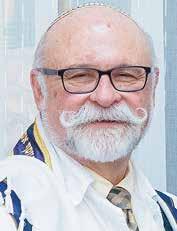
memes on social media in which pictures or words appear to be one thing and then another.
The trumpet has evolved over the millennia since it was employed by our ancestors, but the importance of music, words and sounds has remained the same. Whether it is the delicate music of the Baroque era, the joyful sounds of swing and jazz, or simply the clarion calls of the bugle, the trumpet reminds us all to listen, to hear, and to respond emotionally, physically and spiritually.
“Shema Yisra’el, Hear, O Israel … with all your heart, with all your soul, and with all your might.”
Shabbat Shalom!
Email news@stljewishlight.org

In this week’s Torah portion, Shelach L’cha, the Israelites find themselves standing on the border of Eretz Yisrael, the land promised to their ancestors by God. After suffering for so long at the hands of the Egyptians, they will finally have a home where they will not be subjugated or oppressed. We can imagine this moment as a time filled with anticipation and joy. But for the Israelites it is also a time fraught with worry, uncertainty and fear. The people want to know what they can expect when they enter this new land, so Moses sends 12 leaders, one from every tribe, on a scouting mission. The scouts are gone for 40 days, and they bring back a report of all that they observed.
They tell Moses and the people that, yes, this is a land flowing with milk and honey, a land capable of producing massive fruits, with grapes the size of grapefruits. They also note that the people who currently inhabit the land are y’liday ha-anak, literally “children of giants” — these people are huge! They explain that the cities are heavily guarded and that the land is surrounded by enemy nations.
Joshua and Caleb, two of the 10 scouts, acknowledge that these frightening facts about the land are true. Yet, they still insist, “Ki yachol nu-chal la — We can surely do it!” (Num. 13:30).
Unfortunately, the other 10 scouts voice a different view. They say that the inhabitants of the land wield too much power and that the task is too great. They describe the land as a place that “devours its inhabitants.” They reveal how helpless they feel to act in the face of all these challenges by saying, “We felt like grasshoppers in our own eyes, so we must have looked like grasshoppers to the inhabitants as well” (Num. 30:33).
After this statement, the whole of the Israelite community is convinced of their
own smallness, and they weep, saying that they want to return to Egypt. They lose hope, they lose faith, and they lose the courage they had that helped them take those first steps across the Sea of Reeds towards freedom. Saddest of all, they give up on the vision that was gifted to them at Sinai — a vision of a world where justice takes its rightful place in the center of society and care for vulnerable is the law of the land.
Perhaps some of us can relate to the Israelites of this week’s portion. We, too, may feel like we are facing a world filled with giants. Between gun violence, infant mortality rates, the eradication of our con-
stitutional right to access abortion, the banning of gender affirming care for minors, and a lack of a serious plan to deal with climate change, we live in a land that is actually devouring its inhabitants. We live in a land where rising antisemitism and hate crimes target not only Jews, but also people of color, immigrants and the LGBTQ+ community. We live in a land where voting restrictions and gerrymandering make us fearful for the future of democracy.
It is understandable if, in response to this reality, we feel a deep sense of grief as well as righteous anger, exhaustion, and fear over what we believe our nation and world are becoming. It is understandable if we, like the Israelites, want to throw up our arms and walk away, leaving the fight to others who are stronger, better equipped, or more up to the task.
But confusing these feelings with our actual ability to take action, to make a difference, and to work for change — that would be repeating what we call the sins of the spies. We, as a Jewish community, have been given a transformational vision of the world as it ought to be, a world of compassion, justice and peace.
If we truly believe in and value this vision, then giving into hopelessness at the current state of the world is not an option. Instead, we are called upon to remember Joshua and Caleb, the two spies who saw the exact same challenges and peril, who felt that same fear and still insisted, “We can surely do it!”
This work of creating a world that is just, that cares for those who cannot care for themselves, that respects the bodily autonomy of each person, and that celebrates the differences that make us beautiful is not easy. But it is the task that has been set down for us, and together, with God’s help, we can surely do it.
In the May 24 Light, columnist Marty Rochester tries to defend the indefensible conservative media (“What to make of Tucker Carlson — and other journalists today”). In the face of all the latest lawsuits lost by the revealing that their “news” is nothing more than conservative talking points, he alleges that left and right news sources are all the same.
We have heard this “what aboutism” from conservatives many times when they deny any wrongdoing.
We need a strong opposition party because it is good for democracy. Unfortunately, Republicans are more interested in establishing an autocracy that is not interested in governing as much as reducing our civil rights.
Stephen Mandel St. Louis CountyAs an apologist for the right, Marty Rochester, in his May 24 column, claims that the mainstream media — ABC,CBS, NBC, PBS, MSNBC, PBS, CNN, etc. — are no better than Fox News when it comes to telling the truth. As usual he makes a false equivalency, and he conveniently leaves out glaring facts which contradict his position.
For instance, what is the mass media equivalent of Fox News having to pay Dominion Voting Machines $787 million for knowingly broadcasting the falsity that the 2020 election was rigged? But then maybe Rochester still thinks that Trump won.
Alan Rudolph Creve Coeur‘We can surely do it’: Working to create a world of compassion, justice and peaceRabbi Andrea Goldstein, D. Min, serves Congregation Shaare Emeth and is a member of the St. Louis Rabbinical and Cantorial Association, which coordinates the d’var Torah for the Jewish Light.
(JTA) — My 95-year-old mother knows a thing or two about trauma. Not only because she is a survivor of Auschwitz but also because she is a psychologist.
“What worries me,” my mother says, “is that we Jews will succumb to our past trauma rather than rise above it.”
I share my mother’s concern.
Jewish Americans face the threats of escalating antisemitism and growing white nationalism at the same time that the Israeli government’s anti-democratic policies are eliciting increasingly harsh condemnation worldwide.
There is no inherent relationship between antisemitism and the outcry over Israeli policies. But when they occur together, they can trigger traumatic memories and confuse our thinking. This confusion can lead to a dangerous conflation of issues at the intersection of Israel and antisemitism.
Prime Minister Benjamin Netanyahu exploits this confusion to deflect condemnation of his policies. He constructs a misleading equation, portraying severe criticism of Israel as not only a threat to the Jewish state but also to the Jewish people.
To demonize his political opponents, Netanyahu invokes the ultimate act of antisemitism, the Holocaust. He did so when he blasted those negotiating a nuclear deal with Iran and when he reprimanded The New York Times over its criticism of the agreements he reached with farright political parties. His strategy is to downplay antisemitism on the right and emphatically equate left-wing with rightwing antisemitism to obscure their distinctions.
Some Jewish organizations, perceiving strong criticism of Israel as threatening Jewish unity and the Jewish state, reflexively reinforce that equation. A case in point is
Anti-Defamation League chief Jonathan Greenblatt’s approach to anti-Zionism.
Greenblatt used his keynote address at ADL’s annual leadership summit in May to hammer home his assertion that “AntiZionism is antisemitism. Full stop.” Over the past two weeks, he has played a leading role in the campaign to endorse the International Holocaust Remembrance
Alliance non legally binding working definition of antisemitism (IHRA) as the sole such definition in the Biden administration’s U.S. National Strategy to Counter Antisemitism. In a tweet urging its adoption, Greenblatt proclaimed: “Anything else permits antisemitism under the guise of anti-Zionism.”

Greenblatt was worried about reports that the White House would include other definitions in the strategy, such as the Nexus Document, which addresses “the complexities at the intersection of Israel and antisemitism.” Greenblatt has repeatedly denigrated Nexus by calling it a “pasted-up process organized by activists” and circulating inaccuracies like: “The Nexus definition assumes that unless there is outright violence involved, anti-Zionism is generally not antisemitism.”
In fact, the Nexus Document includes seven examples of anti-Zionist or anti-Israel behavior that should be considered antisemitic and four that might not be. As Dov Waxman, a member of the Nexus
Task Force and chair of Israel Studies at UCLA, tweeted: “Nexus clearly identifies when criticism of Israel or opposition to it crosses the line into antisemitism. But because it is clearer than IHRA in this respect, it is less susceptible to being misused and weaponized against Palestinians and their supporters.”
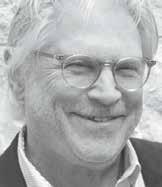
It’s not that Greenblatt doesn’t understand the complexity of these issues. He has taken nuanced and moderate positions on anti-Zionism in the past. But complex formulas impede the use of simplistic equations. If Greenblatt wants to show that anti-Zionism is always an existential threat to both the Jewish state and the Jewish people, he can leave no room for nuance.
Ultimately, the White House acknowledged the significance of utilizing a varied set of resources to combat antisemitism, stating, “There are several definitions of antisemitism, which serve as valuable tools to raise awareness and increase understanding of antisemitism.” The strategy acknowledged that the United States had already “embraced” the IHRA version, describing it as the “most prominent,” and went on to say that it “welcomes and appreciates the Nexus Document” and other efforts.
That formula has angered some supporters of the IHRA definition, including World Jewish Congress president Ronald Lauder, who said: “The inclusion of a secondary definition in addition to the International Holocaust Remembrance Alliance working definition of antisemitism is an unnecessary distraction from the real work that needs to be done.”
Like Greenblatt, Lauder wants to build a consensus around a simple explanation for a complex situation. But their approach actually diminishes our ability to carry out “the real work that needs to be done”
One of the bigger shopping challenges has always been buying gifts for Dad. Since the pandemic changed work attire forever, it also eliminated the lame but reliable fallback of a tie.
So what can you do to show Dad you care on Father’s Day? Donate to nonprofit community causes he values.
Does he value fitness?
• Lift for Life GYM was started by a Jewish Ladue high grad in 1988. With its focus on building strong bodies and strong minds, this north side after school program offers fitness training, homework help, mentoring, life skills and much more. Visit liftforlifegym.org
• St. Louis Senior Olympics is one of many wonderful programs offered by the Jewish Community Center, which involved more than 1,000 local athletes age 50 and over in roughly 90 competitive events this year. Visit tinyurl.com/yuhb24cd
Does he care about gardening?
• Seeds St. Louis (formerly Gateway Greening) provides communities with tools, education and empowerment to grow their own food. The organization supports a network of 250 community gardens, school gardens and urban orchards throughout the St. Louis region. Visit seedstl.org/
Author Nina Needleman is a retired financial planner. She spent the first three-decades of her career in the financial services industry. Now she uses her business skills to help nonprofit organizations and more importantly — as a volunteer to teach people about personal finance and philanthropy.

Does he care about science?
• St. Louis Science Center has a terrific Youth Exploring Science (YES) program. By empowering teens from underserved communities throughout their high school years, the YES program helps teens develop the knowledge, aspirations and critical skills to succeed in careers in science, technology, engineering, the arts and math (STEAM). Visit tinyurl.com/ys99bwv5
• Wesley House Association, a longtime neighborhood pillar offering social service programs for all ages, has a new robotics team project that provides underserved youth exposure to STEM-based programs and enrichment, allowing them to explore their “untapped” talents while introducing them to robotics education. Visit wesleyhousestl.org
Does he care about music and the arts?
• The Sheldon Foundation’s music education for underserved kids is the wow here. Eight hugely engaging curricula initiated 20 years ago and updated annually by leading community musicians, actors and directors introduce kids to history and occupations in the arts. Another program is the foundation’s SOLID camp: the Science of Learning Instrument Design Visit thesheldon.org
• Artists First provides teaching artists for prople with disabilities, empowering artists of all abilities through creative self-expression. Within its charming studio in Maplewood, Artists First has created a community and enhanced self-esteem and purpose for its participants. It also offers art classes for veterans and the cognitively impaired. artistsfirststl.org/#/
Does he care about families?
• Father and Family Support Center works to break the cycle of poverty, child neglect, child abuse and welfare dependence by educating and preparing fathers with parenting skills to foster healthy relationships and communities. fatherssupportcenter.org/
Does he care about health?
• Gateway to Oral Health enables African American dentists to provide dental care to more than 9,000 students at north St. Louis schools. Its mobile unit goes where the kids are so parents don’t have to leave work for a dental appoint-
ment. gtohfoundation.org/ St. Louis Men’s Group Against Cancer has been raising funds since 1969. The money is directed to specific cancer-related organizations that focus on research, prevention and care activities in the St. Louis community. mensgroupagainstcancer.org/
Does he value diversity, equity, and inclusion?
Cultural Leadership helps diverse youth explore the strengths and oppressions of our communities through the lenses of Black and Jewish experiences and develops them into social justice change-makers who advocate for equitable and just practices. culturalleadership.org/
• Disabled Athletes Sports Association provides opportunities to people with physical disabilities to participate in adaptive sports, recreational programs and fitness activities designed to improve self-esteem, strength, independence and well-being. dasasports.org/
• 100 Black Men of Metro St. Louis is an impressive group of business leaders providing mentoring and support for young Black youth in order to positively direct their lives. 100blackmenstl.com/
This is only a baker’s dozen of the 17,000 nonprofits in St. Louis. So again, it’s time to reflect:
Do any of these reflect your father’s interests? If not, what does? What moves him, what makes him angry, what would he like to “fix” in our community? That’s
Gloria Steinem has been a public figure since the 1960s, but there is much to learn and admire about her personal history in “Gloria: A Life.” The play by Emily Mann is fascinating and inspiring in the current production by the New Jewish Theatre.
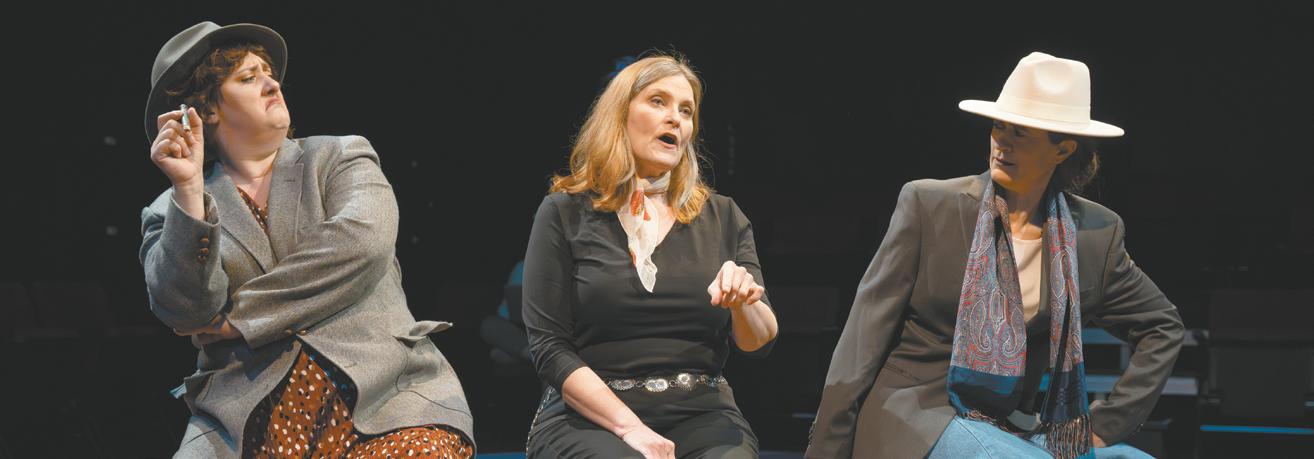
Steinem began a career as a journalist in the 1960s and became one of the bestknown figures in the second wave of feminism in the United States. She gained notoriety for writing an exposé for Show Magazine after working undercover as Playboy Bunny. “Fame gave me a voice,” she says in the play, “but I didn’t know how to use it yet. Actually, I didn’t try hard enough. I didn’t know yet what was possible.”
The seeds for her activism were planted when she covered the 1969 Redstockings abortion speak-out for her column on city politics in New York Magazine. For the first time, she saw woman after woman being taken seriously for telling her personal truth about a female experience.
She was not yet ready to write about her own abortion, though she speaks about it movingly in the play. She came to understand she was complicit in the patriarchy’s humiliation of women because she had internalized its refusal to recognize wom-

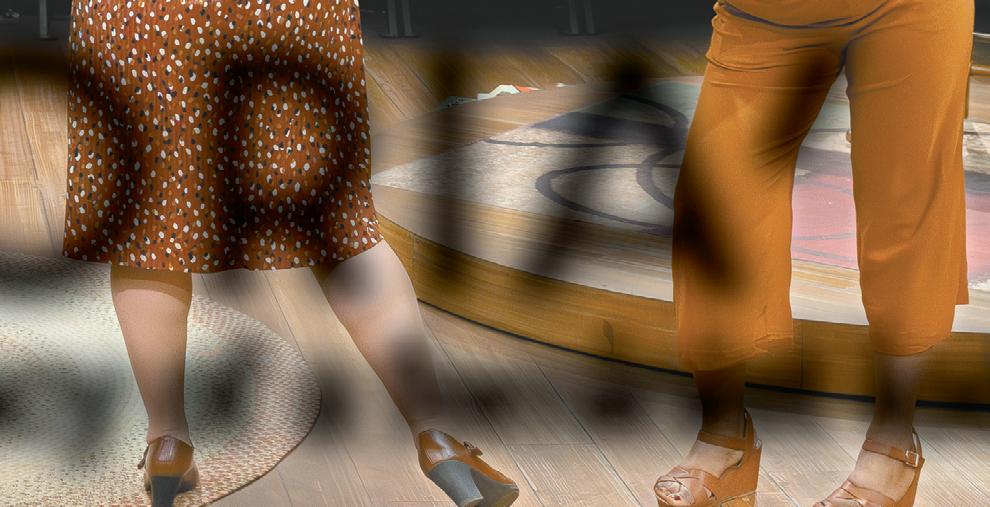
en’s equality.
Raising women’s consciousness to achieve equality became her mission. She combined her passions for journalism and activism when she participated in the founding of Ms. Magazine.
Embarrassed by the privilege fame brought her, Steinem is quick to recognize lesser-known women who helped raise her own consciousness. “The truth is, I learned feminism from black women,” she says. Two of them, Dorothy Pitman Hughes and Florynce Kennedy, are portrayed with great admiration. So is Wilma Mankiller, principal chief of the Cherokee Nation, whom Steinem calls her mentor.
The sections on Steinem’s personal life contain surprises. Her first career ambition was to dance her way out of Toledo, Ohio, by becoming a Rockette. A recurring subject is Steinem’s relationship with her mother, who suffered from mental illness. In one of the most affecting scenes, Steinem recognizes the price her mother paid for the sacrifices she made for her daughter.
As Steinem reports in the forward to the printed text, the play’s origin was a friend’s suggestion that Steinem should turn her life into a one-woman show in which she would play herself. The assignment to write that play eventually fell to Mann, who had an even better idea. Instead of a
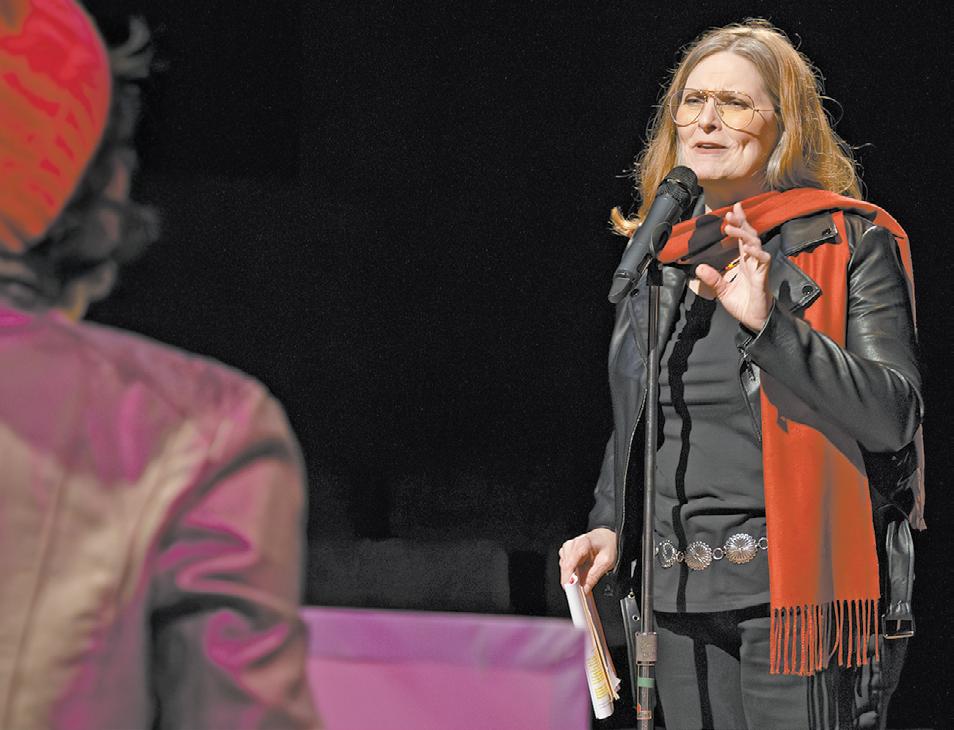
monologue, she developed a script with a cast of seven.
Steinem provides the narrative continuity in the present. When the story reaches an important incident, Steinem channels her earlier self, and the six ensemble members play all the other parts. The episodes in Steinem’s life make a much stronger impression as dramas than they would have in a monologue.

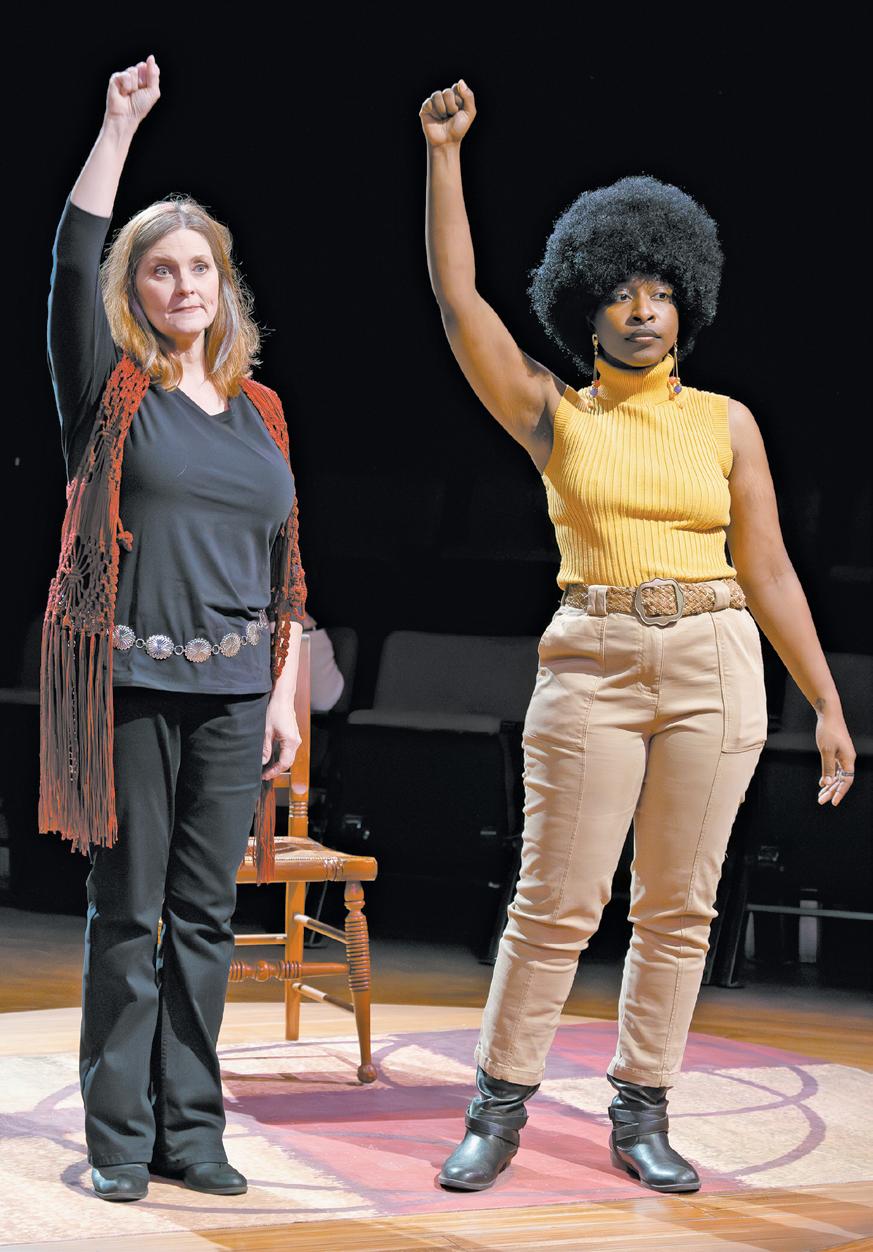
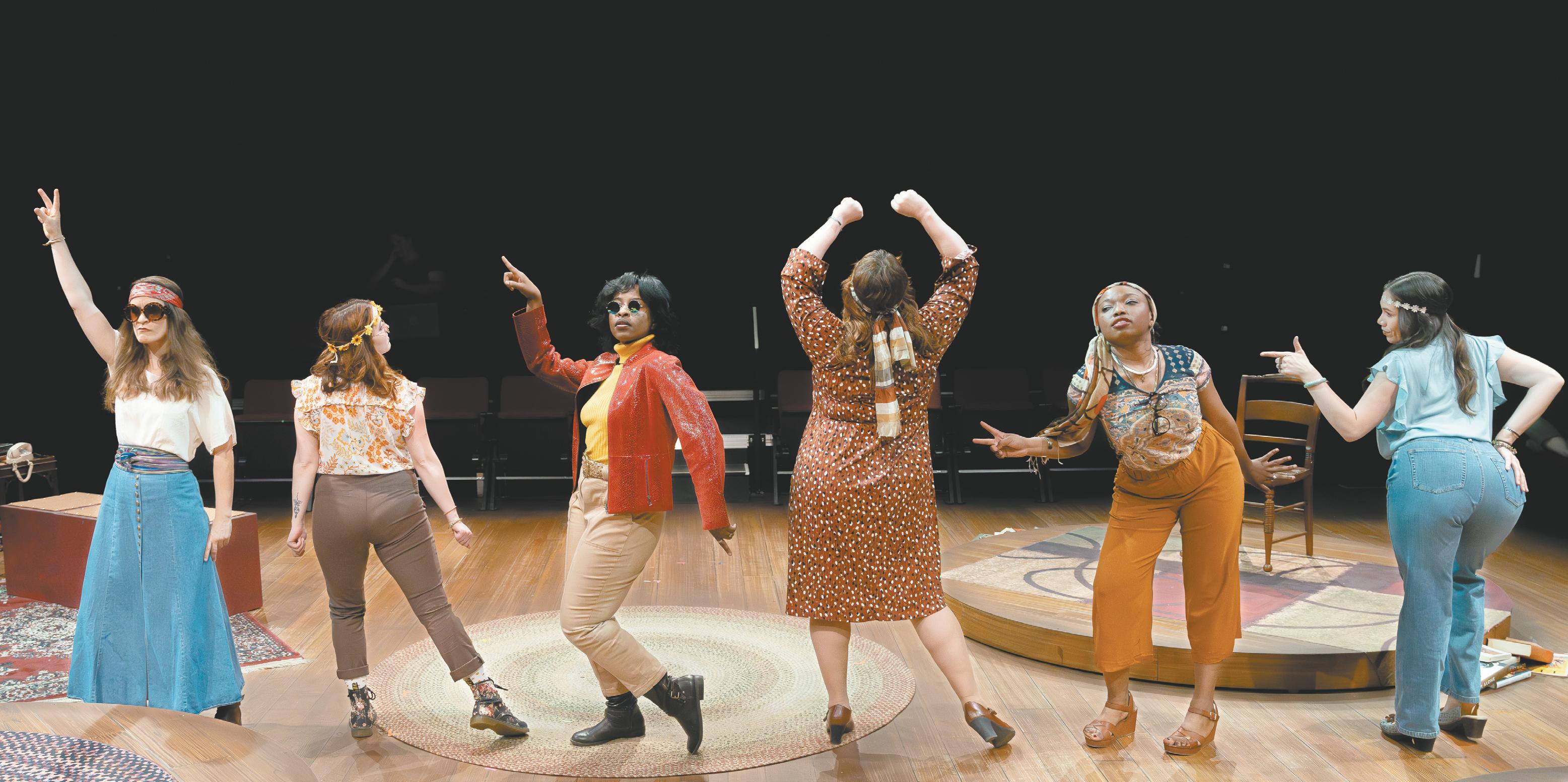

One of the first sketches with characters depicts a cab ride Steinem shared with two famous writer, Saul Bellow and Gay Talese, when all three are covering the same story. Talese’s condescension toward Steinem is appalling. Director Sharon Hunter portrays this outrage and many others cartoonishly. This shrewd approach does not let wrongdoers off the hook but prevents the action from becoming unbearably sad.
Jenni Ryan deserves enormous credit for accepting the role of Steinem on very short notice. She held a script on opening night but seldom used it. Her portrayal is already solid and insightful. It will surely grow even deeper as Ryan spends more time in the part.
The excellent ensemble includes Summer Baer, Kayla Ailee Bush, Sarah Gene Dowling, Carmen Cecilia Retzer, Chrissie Watkins and Lizi Watt. They switch from one part to another with total
assurance and make the most of opportunities to touch the heart.
Hunter stages the play fluidly in the round under helpful lighting by Denisse Chavez on a set designed for flexibility by Fallon Podrazik. The periods Steinem lived through are splendidly evoked by Michele Friedman Siler’s costumes, Amanda Werre’s sound, Katie Orr’s props, and the wigs constructed by Rebecca Mack in consultation with Dennis Bensie.
The play ends with a talking circle. It is not a traditional theater talkback, in which panelists reply to questions from the audience. Instead, the audience is called on to provide the answers. The question from the stage is, “Can you tell us how or if the story we told tonight resonates with your story?” Attendees have a chance to learn from others in a talking circle just as Steinem did at the Redstockings speakout.
‘Gloria:

WHEN: Through June 18
WHERE: New Jewish Theatre’s Wool Studio Theater in the Jewish Community Center’s Arts & Education Building, 2 Millstone Campus Drive
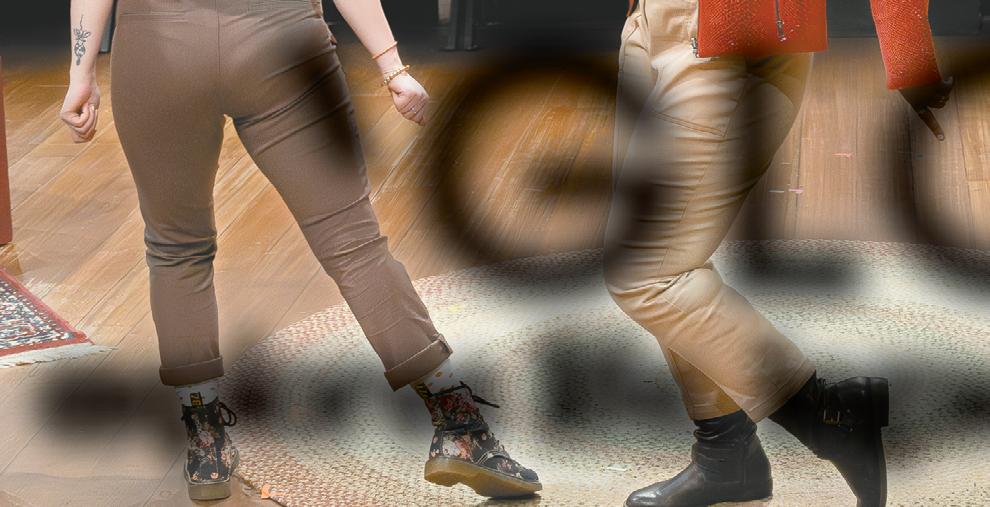
HOW MUCH: $27-$58
MORE INFO: 314-442-3283 or visit newjewishtheatre.org
‘Gloria’ explores life, legacy of a feminist icon
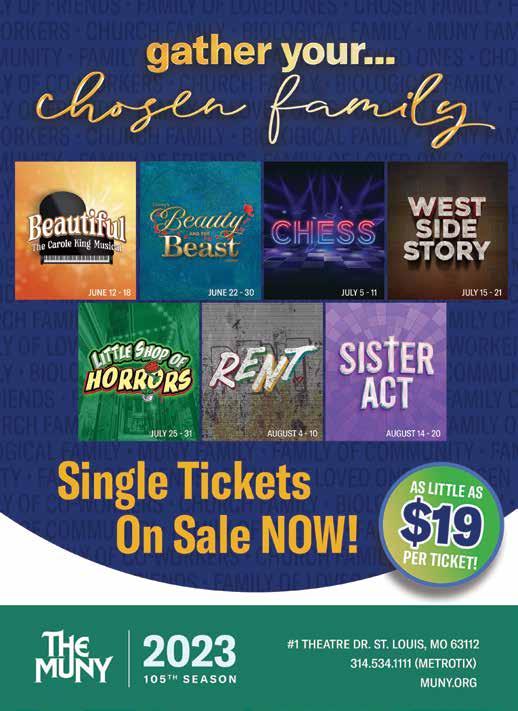 BY NATE BLOOM SPECIAL TO THE JEWISH LIGHT
BY NATE BLOOM SPECIAL TO THE JEWISH LIGHT

“The Crowded Room” is a 10-episode series that begins streaming on Apple+ on June 9. The screenplay was written by Oscarwinner AKIVA GOLDSMAN, 60 (“A Beautiful Mind”).
Plot: Danny Sullivan (Tom Holland) is arrested following his involvement in a shooting in New York City in 1979. Interviews with interrogator Rya Goodwin (Amanda Seyfried) reveal his “mysteries.”
EMMY ROSSUM, 35, co-stars as Danny’s mother. Rossum is best known for her starring role as Fiona Gallagher in the Showtime series “Shameless” (2011-2021).
British Jewish actor JASON ISSACS, 59, plays Jack Lamb, a friend of Danny’s biological father, and LIOR RAZ, 51, plays Yitzhak Safdie, Danny’s landlord. He becomes an important figure in Danny’s life.
Raz, a retired elite Israeli commando, was Arnold Schwarzenegger’s bodyguard for a few years in the ’90s. He lives in Israel with his wife and children.
The Tony Awards will be broadcast on CBS at 7 p.m. on Sunday, June 11. This year’s awards will stand-out in your memory if the best play nominee, “Leopoldstadt,” wins the best new play (it’s the heavy favorite) and goes on to be turned into a top-notch streaming series.
I am getting ahead of myself. “Leopoldstat” follows an (extended) upper-class Austrian Jewish family from 1899 to 1955. The main scenes are in 1899, 1924, 1938 (right after the Nazi takeover) and 1955. About 35 family members are in the three first scenes. The last scene features the three family members
who survived the Holocaust.
“Leopoldstat” is one of a kind. While the play has some humor, it’s an expensive play (35 actors!) that addresses grim topics like antisemitism, Jewish assimilation and the Holocaust, and it’s not likely to be mounted again in London or on Broadway. “Leopoldstadt” was staged because its playwright, Sir TOM STOPPARD, 85, is universally viewed as the best living English playwright----and his “Leopoldstadt” script is as good as any he’s ever written.
Stoppard did not find out that he is the son of two Jews until the early 1990s. His parents were non-observant Czech Jews. His father, EUGEN STRAUSSLER, a company doctor, was sent to Singapore by his company when the Nazis took over (1938) Czechoslovakia. He was accompanied by his wife, MARTHA, and his sons, Tom, then about a year old, and PETER, 3. Martha and the boys fled to India when Japan entered (1941) the war. Eugen stayed-on to help the British army and was killed. In India, Martha met a non-Jewish British officer. She married him and he adopted the boys. He raised them in the U.K. as “proper Englishmen.”
Martha kept the secret of her Jewish background from Tom for her entire life. He had suspicions, and asked some questions, but Martha would never open up. In the early 1990s, Czech Jewish cousins finally contacted their famous playwright relative. One cousin showed Sir Tom photos of Martha with her Jewish family members. He learned that all four of his grandparents died in the camps.
In recent interviews, Stoppard said that he was partially at fault for not learning his origins before he did. He added that a character in the 1955 segment of his play—a character
who didn’t know anything about his Jewish family’s fate—is somewhat based on him.
The big news is that there is a strong possibility that “Leopoldstadt” will become a limited streaming series. STEVEN SPIELBERG, 76, will produce, and PATRICK MARBER, 58, is rumored to be set as the director. He directed the London and New York stage versions and is nominated for the best director Tony.
If a series is made, it should be something really special that millions will likely see. The writer’s strike is making everything uncertain now.
Here are the other Jewish nominees up for a Tony this year: Best new musical: “New York, New York” (music by Kansas City native JOHN KANDER, 96) and “Some Like it Hot” (music by MARC SHAIMAN, 63); Best Musical Revival (all four nominees were written by Jews): “Into the Woods” & “Sweeney Todd”—songs by STEPHEN SONDHEIM; “Camelot,” songs by ALAN J. LERNER and FREDERICK LOEWE; and “Parade” (about the lynching of Jewish businessman LEO FRANK in 1915); songs by JASON ROBERT BROWN, 52.
Lead actress, play: JESSICA HECHT, 57, “Summer, 1976”; Lead actress, musical: MICAELA DIAMOND, 23, “Parade.” She plays LILLIAN, Leo Frank’s wife; Lead actor, musical: BEN PLATT, 29, “Parade.” He plays Leo Frank; Featured actress, musical: JULIA LESTER, 22, “Into the Woods”; Featured actor, play: BRANDON URANOWITZ,36, “Leopoldstadt”; Best director, play: Patrick Marber, “Leopoldstadt”; Best original score, Shaiman, “Some Like it Hot”; and JEANINE TESORI, 61, “Kimberly Akimbo.” Shaiman and Tesori’s shows are favorites to win.
Idina Menzel, one of the most iconic vocal performers of her time, has been announced as a headliner for this year’s St. Louis PrideFest 2023.
The festival runs June 24 from 11 a.m.–6 p.m. and June 25 from 12–6 p.m. across from City Hall in downtown St. Louis. This year’s theme is “Diversity Creates Community.”
Kat Graham and Betty Who will be on stage on Saturday. CeCe Peniston will kick off the entertainment on Sunday, followed by Menzel, who will close out the festival.
“Pride St. Louis is super excited to have Idina Menzel headline our McDonald’s Main Stage on Sunday June 25th. Her music reaches so many people no matter if you’re young at heart or the youngest festival goer at Pride,” said Marty Zuniga, President of Pride St. Louis Inc. “We look forward to her showcasing her talents and celebrating pride with us in St. Louis.”
For a full schedule and more information, visit pridestl.com.
School is out for the summer. Raise your hand if you loved summer break. Sleeping late, going swimming, camp, no homework. It makes me long for my youth.
But kids these days do things differently than we did back in the 1900s when we were young.
T H E N
T H E N n o w
T H E N n o w
we rode bikes with no helmets
n o w










Kids wear helmets, sometimes knee pads and elbow pads maybe even a maxi pad, just for extra protection
We would go “out to play,” roam the neighborhood without our parents hovering and manage to make it home in time for dinner

at all times You can track their speed, too, so if you have a young driver, you can greet them at the door with, “So how was it driving 70 in a 55 and living to tell about it?” I even track my 86-year-old mother on an app, so I don’t have to call my sister, who doesn’t even live here, to ask, “Where is Mom?”
In gym class, we had to take the Presidential Fitness Test in which they would weigh the kids and announce their weight Out loud For people to hear Sadly, crawling into a hole was not part of the fitness test
For Halloween, we would dress as cops and robbers
Dressing that way would be offensive to both the cops and the robbers
T H E N n o w
For your birthday, you brought treats to school for your class, baked at home by your mom No one was allergic to gluten or nuts
No more school birthday treats because we have so much food in America, we’ve now become allergic to it, and kids could become seriously ill if they ate the wrong thing And because we are so sensitive to everything these days, the schools feel that kids with summer birthdays would feel left out So, no treats

T H E N
Long distance prices made it rare for you to talk on the phone to friends and family who didn’t live in the same city as you The phone company charged by the minute!

We have body inclusivity If you make a comment, it’s called “fat shaming ”
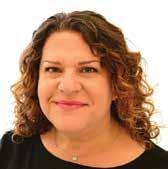
T H E N n o w
We drank whole milk
There are umpteen milk choices now including cow milk, oat milk, soy milk, almond milk I didn’t even know almonds had nipples
T H E N n o w
When you picked someone up at the airport, you could meet them at the gate
Only passengers with a ticket are allowed in, and you have to show about 97 forms of identification before even going through security
T H E N n o w
When we had fights, we had real fights Like fist fights Like meet me out back after school fist fights
ds fight with words On the ternet Or if you tick someone off traffic, you get shot Kind of kes fist fights look pretty good, don’t you think?
Smoking cigarettes Everywhere You could smoke in the office, the grocery store, on an airplane N


You can smoke only in designated areas
Oddly, though, everywhere you go it smells like weed Come on, stoners, just eat a gummy We don’t care if you do it, but we don’t want to smell it

CONTINUED FROM PAGE 1
myself out there more. And so when I started doing improv, it helped me be more vulnerable and then have deeper, more meaningful relationships. That includes the friendships and the relationships I’ve had with my partners. It opened me up a lot to be a more well-rounded person.”
Regardless of one’s occupation, improv offers a set of skills that can be beneficial, said Peter Barg, who has worked in TV production and animation and is the board president of Compass Improv.
“If you have worked for a big business, they have meetings, and they talk about listening,” said Barg, 67. “One of the biggest things that improv is about is active listening. Listening to what your partner is telling you or the visual cues of what your partner is doing, the way they’re looking at you. What improv does is it gives you a quiver of skills to work with. You’re also connecting with people that have a shared interest. It’s kind of nice to be in a room and know that you’re all there for the same reason.”
Improv participants quickly learn how to think on the fly out of necessity because there is no script. They build a sense of trust with their partners, who can pick up a thread of an idea. Often, improv shows start when an audience member calls out a word or subject. The improv troupe has mere seconds to begin a scene. There are no props, no cue cards. It’s up to the actors to create a reality for the audience by creating a plot out of nothing.

It is precisely that sense of working without a net that is a big draw for performers who specialize in improv, such as Ed Reggi, who teaches improv at COCA and attends Central Reform Congregation.

“I was interested in acting in the theater at a very young age,” said Reggi, 52. “I was very fortunate that I had some fantastic teachers who exposed me to improv.”
Modern improv was pioneered by Jewish impresarios, producers and actors, Reggi said.
“There are a lot of connections to Judaism and Jewish people in the art form itself, like Viola Spolin, who was a Russian Jewish immigrant,” he said. “If it weren’t for Viola, we would not have what we call today improvisation at all. She wrote the first book on it in the late 1940s and early 1950s. Her son Paul Sills went on to found Second City.
“Those early days of improvisation as an

art form started branching away from traditional acting. It just a way to connect to the audience, to bypass the idea of a playwright or a writer having to write the material. It gave access to the actors to do something immediate without rehearsing and paying royalties. It was literally like the most accessible form of entertainment in front of a live audience.
“It’s the only art form where everyone in the cast is the director. Everyone is a choreographer, everyone is the actor. We’re all doing it together at the same time.
“We have a Level 0 for people who may be a little hesitant and don’t know a lot about improv,” she said. “They just want to get their feet wet. It’s very nonthreatening. Then we also have a Level 1. There’s no pre-req to take Level 0. Part of what we do the first day is everybody talks about why they’re there. We get people who do it for the public speaking aspect. We also get a lot of people who just moved to St. Louis.”
A variety of entry points are available in St. Louis for new improv practitioners, Barg said.

“ComedySportz offers a drop-in every Monday night at the Pat Connolly Tavern,” he said. “Bob Baker offers a Thursday drop-in once or twice a month in person and online (at bob-baker.com/buzz/improv-comedy-st-louis). He also offers a musical improv drop-in. Compass Improv is working to offer classes and opportunities.”
A recent Compass improv master class featured Jewish improv coach and instructor Michael Gellman, who has directed Tina Fey, Steve Carell and Gilda Radner.
COCA offers an improv theatre class taught by Reggi that is part of its Free@3 series. As the name suggests,
YOUR CALENDAR OF ST. LOUIS JEWISH COMMUNITY EVENTS
FRIDAY | JUNE 9
‘On the Record’ with Bob Cohn
On the second Friday of every other month, join On the Record hosted by Bob Cohn, editor-in-chief emeritus of the Jewish Light, from 11 a.m. to noon to discuss films, plays, articles and books on issues of concern to our community. This online program is provided with FEL (Friends Enjoying Life), the Mirowitz Center men’s organization. Register online at http://bit.ly/Register_ MirowitzCenter or call 314-733-9813.
SATURDAY | JUNE 10
Andrew Rehfeld discusses Reform Judaism and the Kodak Instamatic
Andrew Rehfeld, president of Hebrew Union College-Jewish Institute of Religion, will return to St. Louis to discuss “Reform Judaism and the Kodak Instamatic” from 9:30 to 10:30 a.m. at Congregation Temple Israel, 1 Rabbi Alvan D Rubin Dr. What is “Reform Judaism” and how does an approach to Judaism now over 200 years old continue to drive meaning and purpose today? In this talk, Rehfeld will explore the history of the Reform movement, the institutions that it created, and the ideas that drive it, and ask what it means for the future. Registration required at www.ti-stl.org/ event/Rehfeld or by calling the office at 314432-8050.

SUNDAY | JUNE 11

At 4 p.m. Kol Rinah welcomes Donn Rubin, founding president and CEO of BioSTL and a Kol Rinah member, for a discussion about the work that BioStl has done. RSVP at kolrinahstl.org/event/jews-in-science--23.html
TUESDAY | JUNE 13
From 10 to 11 a.m. join the Mirowitz Center for an online discussion by Mike Ferman, a former partner at RubinBrown Advisors, about current conditions in the economy and capital markets. This free program is provided in conjunction with FEL (Friends Enjoying Life), the Mirowitz Center men’s organization. Register online at http://bit.ly/ Register_MirowitzCenter or call 314-733-9813.
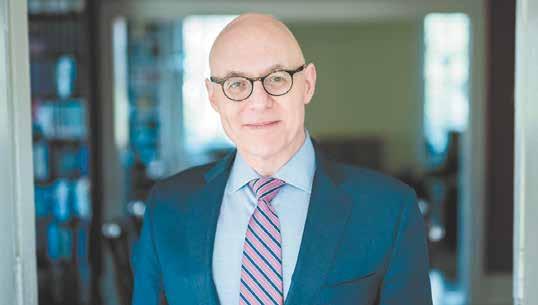
Ze’ev Smason
From noon to 1 p.m. Rabbi Ze’ev Smason will continue his monthly Mirowitz Center series with a look at “Are you a Jewish American or an American Jew?” Free and in-person. Register online at http://bit.ly/Register_MirowitzCenter or call 314-733-9813.
THURSDAY | JUNE 15
Mirowitz
Librarian Hillary Peppers is facilitating two book club discussions, in person at the Mirowitz Center and online, on the third Thursday of each month. Free. Register online at http://bit.ly/Register_MirowitzCenter or call 314-733-9813. The June book is “Tomorrow, and Tomorrow, and Tomorrow” by Gabrielle Zevin. The online book club meets from 10 to 11 a.m. and the in-person club meets from 1 to 2 p.m.
At noon, join the National Council of Jewish Women-St. Louis for a lunch and learn on “The State of LGBTQ+ Rights in Missouri” with Sen. Greg Razer. In honor of Pride Month, NCJWSTL welcomes Senator Greg Razer, who is the only openly gay member of the Missouri State Senate. As a once-suicidal teen struggling with his sexuality growing up in southern Missouri’s cotton country, Razer especially feels a kinship with transgender youth who are targeted in our state. He spent this year’s legislative session standing up for these kids and worked relentlessly to try and stall bills targeting transgender youth. Prior to his election to the legislature, Razer was a field organizer for PROMO, the state’s major LGBTQ+ advocacy organization, and worked on the campaign staff of Sen. Claire McCaskill. Register online at https://bit.ly/NCJWSTL_ June15 or email Jen Bernstein at jbernstein@ncjwstl.org for more information.
From noon to 1 p.m. Maxine Mirowitz will lead Storywriter’s Guild 2023, a two-part program (June 16 and 23) at the Mirowitz Center. Writers of all levels are encouraged to uncover and write their stories. Class size is limited to 10 participants. Register online at http://bit.ly/Register_MirowitzCenter or call 314-733-9813.
SATURDAY | JUNE 17
Farewell Shabbat for Rabbi Shafrin and family
Kol Rinah will say goodbye to Rabbi Scott Shafrin and family. Visit kolrinahstl.org for more information.
MONDAY | JUNE 19
Kol Rinah Zoom discussion
At 7:30 p.m. Kol Rinah is planning a Zoom discussion on “Feeding Women of the Talmud and Ourselves.” For more info and to RSVP, visit www.kolrinahstl.org/event/feeding-women-of-the-talmud-and-ourselves. html.
On June 10, Andrew Rehfeld will discuss “Reform Judaism and the Kodak Instamatic” at Temple Israel.
WEDNESDAY | JUNE 21
An evening of song, storytelling and inspiration in Chesterfield Chabad of Chesterfield Center for Jewish Life will host an evening marking the yahrzeit (day of passing) of the Lubavitcher Rebbe, Rabbi Menachem Mendel Schneerson. The evening will feature dinner followed by an immersive musical experience called Judaism: The Soundtrack, featuring Jewish Hasidic melodies, fascinating narratives and motivational messages. The event is designed to appeal to people at all levels of knowledge, including those without any prior experience or background in Jewish learning. Programs are open to the public. Suggested donation is $45 for the evening. For more information and to register, call 636-778400 or visit bit.ly/THESOUNDTRACK.
Sharsheret’s Breast and Ovarian Cancer Support Group
This monthly group provides support, connection and education to women in the St. Louis Jewish community who have been diagnosed with breast or ovarian cancer and are anywhere along their treatment path –before, during, or post-treatment. Facilitated by a licensed clinical social worker, this group meets from 6:15 to 7:30 p.m. on the third Wednesday via Zoom until further notice. Newcomers are always welcome along with female family and friends. Sharsheret Supports STL is a program of the J’s Nishmah and a partner of the national, not for profit Sharsheret organization. This program is free but pre-registration is requested to Debbi Braunstein at 314-4423266 or dbraunstein@jccstl.org.
‘Gender Identity and Judaism’
See related news brief on Page 4
THURSDAY | JUNE 22
Mirowitz Center presents ‘Ukuleles Unplugged’ 2023
From 2 to 3 p.m. the Jumping Fleas Quartet will perform a free concert at the Mirowitz Center. The band includes Brad Griffith, Marvin Rennard, Bill Luppens and Don Dempsey. Register online at http://bit.ly/ Register_MirowitzCenter or call 314-733-9813.
FRIDAY | JUNE 23
Pride Shabbat at TI
Kick off Pride weekend and show support for the LGBTQ community by wearing a bright, colorful outfit to Shabbat services at Congregation Temple Israel. During the sermon, the Rabbis will speak about inclusion and why supporting all our fellow human beings is an essential part of our Jewish beliefs. There will be a pre-oneg at 6 p.m., followed at 6:30 by Shabbat services, ending with a dessert oneg. Attend in person: Details and RSVP at www.ti-stl.org/Pride. Attend online by visiting www.ti-stl.org/Watch.
Local Jewish organizations and congregations can submit calendar items to news@ stljewishlight.org. All items received by 5 p.m. Friday will be considered for the following week’s edition.
Jewish War Veterans Post 644 will hold their annual picnic in Stacy Park at 3 p.m. For more information and the Zoom link contact Post 644 Commander Ellis Frohman at 636-519-7512 (leave a message if no one answers).
NHBZ invites kids of all ages to join the fun every Saturday morning from 10 to 11:30 a.m. Children enjoy age-appropriate learning and games that are divided into the following age groups: ages 3-6; ages 7-12; and ages 13 and older. Babysitting is always available for children ages 3 and under. These programs are free of charge and NHBZ membership is not necessary for families to participate. RSVPs are not needed. For more information, call 314-991-2100.
Join the Mirowitz Center for a variety of exercise classes, ($5 fee/class and in person) Mondays through Fridays, from 11:15 a.m. to noon. All techniques and combinations will be demonstrated both sitting and standing. Mondays: Fitness with an Edge with instructor Lucy Fox; Tuesdays: Music, Movement and Dance with instructor Rachel Gross, RPI; Wednesdays: Strength and Conditioning with instructor Rachel Gross, RPI; Thursdays: Tai Chi with instructor Scott Uselmann, RPI; Fridays: Chair Yoga with instructor Maxine Mirowitz. Register online at http://bit.ly/Register_MirowitzCenter or call 314-733-9813.
Professional musician Robert Denison will lead Mirowitz Center Community Singers from 2 to 3 p.m. on Wednesdays. No experience is necessary. Learn from CDs (no printed music). Performance opportunities will be offered. Free and open to the community; register online at http://bit.ly/Register_ MirowitzCenter or call 314-733-9813.
On Fridays at 1 p.m., enjoy movies on the Mirowitz Center’s 14-foot screen. Call the Movies at Mirowitz Hotline (314-733-9812) for the film title and description each week. Free and open to the community.
From 10 a.m. to 4 p.m. the Mirowitz Center welcomes guests to play Mahjong, bridge, poker or Mexican Train dominoes – whatever games you like. The Mirowitz Center will provide complimentary coffee, tea and water (guests can bring their own snacks to enjoy and share). No RSVPs are necessary for these weekly games, held in the multipurpose room, but plan to coordinate your group’s schedule and any needed substitutions. Register online at http://bit.ly/ Register_MirowitzCenter, call 314-7339813, or email skemppainen@mirowitzcenter.org.
For those looking for one-on-one assistance with their technology devices and those who are wanting to acquire new skills, free, in-person 30-minute appointments are available at the Mirowitz Center. Tech Tutor’s in-person classes will be led by an extraordinarily qualified instructor, Larry Edison. Tech Tutor is supported through a grant from the Women’s Auxiliary Foundation for Jewish Aged. Register online at http://bit.ly/Register_MirowitzCenter, call 314-733-9813 or email skemppainen@mirowitzcenter.org.
By
Yoni Glatt,koshercrosswords@gmail.com | ‘Where Can I Get the Recipe?’ Difficulty: Easy Across
1. Wife of Yosef
6. Inc., in London
9. There’s one of Man
13. Architecture plans
14. Debt letters
15. Hershey bar with toffee
16. Notable work by Susie Fishbein
19. Famous Hun
20. Shows respect to a commanding officer
21. Blog feed letters

22. Dangerous, as a winter road
24. Wanna-___ (pretenders)
25. Notable work by Jamie Geller
30. “I never ___ coming!”
33. Lobster limb
34. Kind of poem
THIS WEEK’S PUZZLE ANSWERS
Find the answers to this week’s puzzle by visiting the following link: http://bit.ly/0607-crossword
35. Shabbat preceder?
36. It’s similar to 14-Across
37. Esau, for one
38. Medicine regulators: Abbr.
39. Taste, in a Hebrew-speaking kitchen
40. Cut’s common follower
41. Notable work by Michael Solomonov
44. Plants need it
45. 1948 and 1967, for short
46. Friday letters that precede “F”
49. Arab Disney hero voiced by Scott Weinger
53. Prime Minister Ariel
55. Notable work by Leah Koenig, with “The”
57. Surgeon’s subj.
58. Minor league level
59. Take advantage of, as privileges
60. Baseball’s best team in 2023, so far
61. ___ Yomi
62. Had enough
1. Liam in “Schindler’s List”
2. Sees
3. Bird houses
4. Bro, to Yigal
5. Poet whose work inspired “Cats”
6. Ad ___
7. Woody and Buzz, e.g.
8. Former Met Lucas, who might be sick of “Camptown Races”
9. This paper has them
10. “SNL” and “The Carol Burnett Show”
11. Field-level alternative
12. Coastal diving birds
17.
32. Erodes
36. Ripken of note
37. Some say it these days instead of “mashiv haruach...”
39. Guards, as a hockey goal
40. Tzeddakah boxes
42. Financial reviews
43.
JEROME BADER, July 15-1933 – May 23, 2023
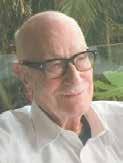
Jerome Bader, age 89, passed away peacefully early Tuesday morning.

For 65 years he shared his life with his beloved wife, Barbara, whom he met at the University of Texas. Jerome was the adored father of Terry Bader (Kathy) and Kathy Fehrnstrom (Eric) and the cherished and proud grandfather (PePa) of 4 grandchildren: Samuel Bader (Hallie Miller), Jeffrey Bader (Natalie), Bryan Fehrnstrom and Jason Fehrnstrom. He was the brother of the late Charline Baizer (Dick) and the late Jack Circle (Beverly), the brother-in-law of Leonard Goltzman (Karen) and the son of the late Sam and Mary Bader.
Jerome was a proud graduate of Clayton High School (’51) and Washington University (’54). He began his career at Union Clothing Company, a family-owned retail clothing chain in Missouri and Illinois that later added the Union Jack and Leading Man brands. In 1990, he joined St. Louis Bread Company in the risk management area and remained there for 27 years, helping the company grow from 3 stores to over 1,700.
He was a founding director of Landmark Bank (now Regions Bank). Investing in the stock market was a deep and abiding passion that he pursued his entire adult life. He was a 50+ year member at Meadowbrook Country Club and the Jewish Community Center, where he indulged his love of golf, handball and working out. Most significantly, he had a remarkably large and loyal network of friends from all walks of life and was a trusted mentor and advisor to many. He will be greatly missed by his many adoring friends and loving family.
A Funeral Service was held Sunday, May 28 at Berger Memorial Chapel, 9430 Olive Boulevard. Interment followed at Beth Hamedrosh Hagodol Cemetery. Donations honoring Jerome’s memory are welcomed to Washington University in St LouisDepartment of Medicine (fund number 303530997), 101 S. Hanley Suite 900, St Louis MO 63105, or the charity of your choice. Please visit bergermemorialchapel.com for more information. Berger Memorial Service
GRETA HAHN CAMEL, M.D., passed away May 26, 2023.
Beloved wife of the late H. Marvin Camel, M.D.; dear mother of Lisa Camel of Durham, NC, Dr. Mark (Linda) Camel of Greenwich, CT, David (Erika) Camel of Los Angeles, CA and Susan Camel of Albany, CA; dear grandmother of Andrew, Matthew, Ned, Hannah, Lindsay, Sarah, Lindsay, Noah and Jacob; dear sister-in-law of the late Etta (the late Max) Rosenblatt and the late Dorothy (the late Sol) Yaffe; our dear aunt, cousin and friend.
Greta emigrated from Vienna, Austria to Waterbury, CT when she was just 11 years old. She earned a BA in 1946 and a medical degree in
1949, both from the University of WisconsinMadison. She was the only female in her medical school class. Greta was a practicing physician for nearly 50 years, spending the majority of her career at the St. Louis VA Medical Center, specializing in the research and treatment of systemic hypertension. She was an assistant professor of medicine at Washington University in St. Louis. Upon her retirement she became an active participant in the Society of Professors Emeriti at Washington University.
In lieu of flowers, please make a donation to the Missouri Botanical Garden or the Crown Center for Senior Living. Berger Memorial Service
ELAINE LOEWENSTEIN COHEN, 90, passed away at her home in Tucson, AZ on May 13, 2023, after living a full life.
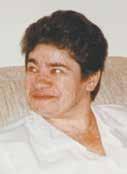

Elaine was born in Peoria, IL. She attended Sophie Newcombe College and subsequently graduated from Bradley University. She married Harry Cohen in 1957. Elaine and Harry raised their two daughters, Sue and Jane, in Peoria.
After being widowed in her early 40’s, Elaine drove west with a case of Baileys in search of new adventures. She settled in Tucson, AZ. In later years, she spent summers in Steamboat Springs, CO.
Elaine was predeceased by her parents, Jacob Loewenstein and Florye Bendel Loewenstein; her sister, Mary Sloto; and her beloved daughter, Sue. She is survived by her daughter, Jane Cohen, in St. Louis, MO.
Elaine was one of a kind. She was independent, inquisitive, and tenacious. She gave suggestions for self-improvement freely. She shared naughty jokes and witty emails with her friends. She never met a stranger.
Although Elaine was diagnosed with genetic Dystonia in her childhood, she did not let it inhibit her. She built a canoe in college and took it to Florida to see if it would float. She was proud that hers did and her male counterpart’s did not. She played golf until the end. Donations preferred to the Dystonia Foundation or the charity of one’s choice.
SVEN GUSTAV ELIASSON, M.D., PH.D. June 4, 2023
Beloved husband of Michele S. Kopolow; dear father of Anders Carl Gustav Eliasson (the late Marybeth), David Sven Eliasson (Kim), and Stephen Keith Eliasson (Kate); dear grandfather of Davin Eliasson (Lauren), Kelsey Allen (Tim), Lauren Roth, Jordan Eliasson, Wren Eliasson, and Lilly Eliasson; dear greatgrandfather of Dresden, Miles, and Avery. Dear brother-in-law of Bonnie Kopolow and the late
Families may submit an obituary for a loved one through the funeral home they work with or by using this form on the Jewish Light website: stljewishlight.org/submit-obituary
Robin Lowy. Dear uncle and dear friend. Sven Gustav Eliasson was born in Malmo, Sweden, on April 16, 1928. Having received a Ph.D. in physiology and a Medical degree specializing in Neurology from Lund University in Sweden, he decided to move to the United States in 1954. After practicing in California and Texas, he accepted a position in the Department of Neurology at Washington University Medical School and Barnes-Jewish Hospital in St. Louis in 1964 where he remained until his retirement in 1992. He was an outstanding physician and researcher and an esteemed professor and educator. He inspired students, not only in medical school and residency, but also taught and advocated tirelessly for those students and professionals in the Departments of Occupational and Physical Therapy. A gifted linguist, knowing 14+ languages, he contributed these skills as a translator for the Missouri Botanical Gardens, the Missouri Historical Society and USC Medical School after retiring from the Washington University Medical School. Survived by his loved ones and those who knew him, he leaves behind a legacy of love, knowledge and care.
Graveside service Wednesday, June 7, 2023 at 1:30 PM at New Mt. Sinai Cemetery, 8430 Gravois. Memorial contributions preferred to the charity of your choice. Please visit bergermemorialchapel.com for more information. Berger Memorial Service
MIKHAIL GERSCHOVICH GALINSKY
Mikhail was born on 12/14/1937 in Kiev, Ukraine to Mother, Asya Gregoriavna Galinskaya, and he was adopted by his grandparents, Beila Moiseyevna Galinskaya and Avram-Gersch Mortkovitch Galinsky, so that they could help raise him and keep their family together. Mikhail had two aunts, Clara and Raya, who were more like sisters to him.
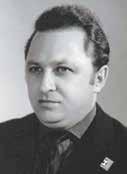
Mikhail died between 11 and 11:11 PM on 5/7/2023.
He was married to Sofya Galinsky for almost 57 years. Mikhail and Sofya married on 04/02/1965 and have three children, Gary Galinsky, Marina Ceballos (Galinsky), and Alex Galinsky. Sofya and Mikhail have five grandchildren, Megan Galinsky, Andrew Galinsky, Olivia Ceballos, Micah Galinsky, and Norah Galinsky. They have three children in law, April Risteff, Helen Tsukerman, and Forrest Ceballos.
Mikhail and Sofya left family and friends in the USSR, and immigrated to the USA in 1978, with their three young children, to give us a better life. We landed in St. Louis, where they lived in University City, Olivette, and Richmond Heights.
He was independent, smart, brave, stubborn, generous, precise, opinionated, and a devoted caregiver.
He was a collector: books, stamps, baseball cards, coins, quarters, VHS tapes filled with recorded movies, CDs, DVDs, records, china, etc.
He worked as a head candy maker at Karl Bissinger’s for 25 years, and he retired from there with a huge celebration. He still wore the engraved watch that they gave him, and he was very proud of his accomplishments. He was also very proud of the high quality chocolate that they made.
He liked reading, watching TV, the news, cooking, Cardinal’s baseball games, soccer games, FIFA, hockey games, boxing, the Olympics, Circus Flora, the Muny, and when he was a child, he loved summer camp in the country, and hanging out with his friends.
He liked going out to eat and he especially liked grocery shopping. He liked watching the birds and squirrels eat the bird seed from the
American Flag symbol denotes a United States military veteran.
feeder, and he loved watching videos and looking at photos of his grandchildren and being on FaceTime with them.
He mostly loved his small family; his spouse, his sons, his grandchildren, and his daughter. Through his actions, taught them the importance of loyalty, integrity, work ethic, selflessness, sacrifice, compromise, and gratitude.
The two main programs and agencies that impacted his life were the Lumina Program with BJC Hospice, and JFS (Jewish Family Services), so please consider donating to one or both of them in his memory.
Sofya was born on 10/15/1946 in Kiev, Ukraine to Mother, Gesya Davidovna Leschinskaya Lager and Father, Boris Lager. Boris later married, Bella, who became Sofya’s stepmother.
Sofya died at 1:47 AM on 12/21/21.
She was married to Mikhail Galinsky for almost 57 years.
Sofya and Mikhail married on 04/02/1965 and have three children, Gary Galinsky, Marina Ceballos (Galinsky), and Alex Galinsky. Sofya and Mikhail have five grandchildren, Megan Galinsky, Andrew Galinsky, Olivia Ceballos, Micah Galinsky, and Norah Galinsky. They have three children in law, April Risteff, Helen Tsukerman, and Forrest Ceballos.
Sofya and Mikhail left family and friends in the USSR, and immigrated to the USA in 1978, with their three young children, to give us a better life. We landed in St. Louis, where they lived in University City, Olivette, and Richmond Heights.
She loved music, singing, and dancing. She recited poems and remembered many lyrics from her favorite Russian songs. She loved to go to the botanical garden, especially the orchid and miniature train displays, as well as the winter lights, and she loved to ride the tram. She loved to see the holiday lights at Tilles Park by car and one time in a horse drawn carriage. She liked the sea, the beach, the pool, but she couldn’t swim. She liked to watch The Golden Girls, Cardinals baseball games, and Family Feud. She loved Circus Flora, especially the comedic guy and the trained cats.
She liked attending Shabbat services at BSKI, which later became Kol Rinah, synagogue and especially loved the cantor’s chanting and singing, and the Kaddish luncheons. She smiled a lot and always remembered things about our friends and would ask about them. She liked going out to eat and her favorite restaurants were Dvin, Stir Crazy, and Taco Bell. She liked watching the birds and squirrels eat the bird seed from the feeder, and she loved watching videos and looking at photos of her grandchildren and being on FaceTime with them.
She mostly loved her small family: her spouse, her sons, her grandchildren, and her daughter. She inspired her kids to be caring, kind, and polite. Taught them the importance of moderation, independence, and a dual language education. She taught the importance of grace and maintaining a positive attitude.
The three main programs and agencies that impacted her life were the Lumina Program with BJC Hospice, JFS (Jewish Family Services), and Kol Rinah synagogue, so please consider donating to one or all three of them in her memory.
Obituaries continue on opposite page
STEVEN GROSSMAN, April 17, 1950 - May 18, 2023.
Beloved husband of the late Tina Varney Grossman, father of Emily Joy Urda, and the late Sara Grossman. Dear grandfather of Joshua Charles Grossman and Jackson Bruce Urda. Loving brother of Diane Grossman Lewis and in-law to Terry Varney Freerks and Stanley Freerks.
He enjoyed spending time with his family and friends as well as being outdoors camping and playing golf. Steven wanted every day to be filled with love, fun and happiness.
AARON J KOMEN, May 30, 2023
Beloved husband of the late Judith McCain; dear father of Mindy Pultman (Brian) and Michael Komen (Ann Schultz) and step-father of Elizabeth Ondra (Tom) and the late Robert Bryans (Brenda); dear grandfather of Sydney Pultman, Samuel Pultman, Taylor Ondra, Danielle Bryans, and Samantha Bryans; dear brother of the late Anna Brick (Irwin), Leonard Komen (Sandy), and Linda Cauble (Andy); our dear uncle, cousin, and friend.
A graveside service was held Monday, June 5 at Beth Hamedrosh Hagodol Cemetery, 9125 Ladue Road. Memorial contributions preferred to Susan G. Komen, Attn: MO 300, 13770 Noel Road, Ste. 801889, Dallas, TX 75380; the Cancer Support Community of Greater St. Louis, 1058 Old Des Peres Rd, Des Peres, MO 63131; or to the charity of your choice.
Please visit bergermemorialchapel.com for more information. Berger Memorial Service
JOYCE LEE MARGULIS, May 30, 2023
Beloved wife of Arthur S. Margulis for 61 years; dear mother and mother-in-law of Arthur Jr. (Elaine), William (Marion), James, and Tom (Ashley) Margulis; dear grandmother of Sarah and Aaron Margulis, Abby Tremml (Brian), Will, Matthew, Ellie, James, Charlie, Tommy and Kate Margulis; dear sister of Judy DeWoskin (late Roger) and Donny Babchick (Debbie); dear sisterin-law of the late Jackie and the late Joel Margulis; dear aunt, cousin, and friend.
A graduate of University City High School and Washington University, Joyce was a lifelong teacher and volunteer. She was a co-founder of Legal Advocates for Abused Women, former President of the NCJW, and former board member of the Zoo Museum District.

A Funeral Service was held Friday, June 2 at Congregation Temple Israel, #1 Alvan D. Rubin Drive. Private family interment. Please visit bergermemorialchapel.com for more information. Berger Memorial Service
We are sad to announce the passing of our sister, mother, aunt, friend, Beverly “Bronwon” (Mandel) McWilliams on May 8th, 2023 at the age of 93.
Born in St Louis in 1929 to Manne & Clara (Geller) Mandel, she was a talented artist, a prolific poet, a brilliant thinker, voraciously curious, and an entirely unique individual who followed her own path at every turn. She was remembered always as a classic beauty by all those who knew her.
Bev had a brief professional career as an actor, performing with Melvin Douglas in a production of Glad Tidings at the St. Louis Empress Theater before entering college at Stanford, transferring to art school, and ultimately graduating from Washington University.
She worked for her family business designing women’s sportswear and moved to New York in her twenties, continuing her career as a designer. She would remain in New York City and upstate New York for the remainder of her life, until 2 years ago when she moved back to St. Louis.
Beverly had an enormous capacity for remembering details, recalling people she had met only once at a dinner party or other event 20 or more years previously and leaving an impression on all those she met. Later in life she married and had a son who inherited and expanded upon her extraordinary artistic ability. She was devout in her belief and devoted to her community of faith. She dreamed of new adventures and conjured creative ideas up until her last moments of consciousness.
She is survived by her son, Christopher McWilliams, brother, Barry Mandel, nieces, Lisa Mandel (Ruth Heyman) & Julie Marcus (David) & stepson, Skip McWilliams. The family is mourning privately. Service to be scheduled in the near future.
HILDA POLSKY, June 4, 2023
Beloved wife of the late Sam Polsky; dear mother of Norman Polsky (Laurie) and Phillip Polsky; dear grandmother of Karen Boyer (Jason), Jennifer McClain, Josh Polsky, Julie Polsky and Andrew Polsky (Gail); dear greatgrandmother of Kennedy, Jaden, Yarden, Sadie, Gabe, Sasha, Reef and Ella. Dear sister, sister-inlaw, cousin, and friend.
A graveside service was held Monday, June 5 at Chesed Shel Emeth Cemetery, 650 White Road. Memorial contributions preferred to the St. Louis Children’s Hospital Foundation. Berger Memorial Service
ALVIN J. REDLER, Jan. 26, 1935 - June 1, 2023
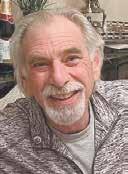
Beloved husband of Alice Feldman Redler. Dear father of Jodi Redler, Vicki (Marc) Redler-Chervitz and Craig (life partner, Deanne Meeks Brown) Redler. Loving grandfather of Cameron and Olivia Redler, Sammy, Sophie and Nathaniel Chervitz. Beloved brother of the late Jules (the late Sandy) Redler. Dear brother-in-law of Joan Gross. Beloved son of the late Emanuel and the late Marian Orenstein Redler. Dear uncle, cousin
and friend.
Al and Alice met at a party when he was 19 and she was 16. They married soon after when she was 18 and he was 21. They recently celebrated their 66th wedding anniversary.
During his life, Al ran his own high risk auto insurance company, Best Insurance Agency. He started working with his cousins and then with Alice. They spent years in their office with desks facing each other. As time went on Alice and Al owned a condo at the Lake of the Ozarks where they spent every weekend going out on their boat, one of his many loves.
Al also loved animals, having three dogs at a time with a sprinkling of bunnies, cats, fish, and a guinea pig. Of course his main love was Alice, Jodi, Vicki, Craig, Cameron, Olivia, Sammy, Sophie and Nathaniel.
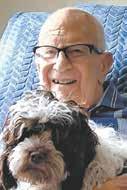
A graveside service was held Sunday, June 4 at Chesed Shel Emeth Cemetery, 7500 Olive Blvd. Live stream available at www.rindskopfroth. com. Contributions in his memory may be made to the Harvey Kornblum Jewish Food Pantry, 10950 Schuetz Road, St. Louis, MO 63146 or to the Barbara Mendelson Tomchei Shabbos Kosher Food Pantry, C/O Martha, 7 Highgate Rd. St Louis, MO 63132. A Rindskopf-Roth Service
REBECCA STARR ROTHMAN (1956-2023)

Rebecca Starr Rothman, fondly known as the “Queen of Carpet,” passed away on Sunday, May 28, 2023, at the age of 67. A beloved personality in St. Louis, Becky enchanted the hearts of many as she flew her magic carpet around the Arch, representing her esteemed carpet business, Becky’s Carpet & Tile Superstore. She was a passionate lover of life, her Dobermans, and above all, her beloved daughter. Becky’s radiant spirit, symbolized by her namesake “Starr,” will forever shine in the memories of those who knew her.

She is survived by her devoted daughter, Rachel Reynolds, whose life she touched with
boundless love and guidance. Rebecca leaves behind her sister, Delores Akins (George) Raveling, and her brothers Jules Rothman, Arnold (Andrea) Rothman, Jerry (the late Deborah) Rothman and her sister-in-law, Debra Rothman.

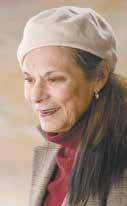
Becky held a special place in the hearts of her nieces and nephews, whom she adored as the “loving and most beautiful aunt.” Litisha Akins Hall and Julie Wheat, along with Lee Rothman, Marc Rothman, Alex Rothman, Scott Keller, Michael Rothman, Coby Rothman, Adam Rothman, and Eric Rothman, will forever cherish the memories and love shared with their Aunt Becky.
Rebecca was a proud “granny” to Skylee, Kelani, Kalea, Harrison, and Soleyah, as well as her cherished feline companions, Ava, Alvin, and Fievil. Her nurturing presence and unwavering love brought joy to the lives of her grandchildren. She is also survived by numerous extended family members, friends, and fans who were touched by her warmth and genuine kindness.
Rebecca was preceded in death by her father, Murray “Maishe” Rothman, her mother, Donna Rothman, and her brother, Allan Rothman. Their memories will forever hold a special place in the hearts of those who loved them.
The family would like to express their heartfelt gratitude to Dr. Heidi Joist and the compassionate staffs at Missouri Baptist Medical Center, Fresenius Frontenac, and Fresenius Creve Coeur for their unwavering support and care during Rebecca’s health journey. They are especially grateful to Julie Brick-Brinley for her exceptional dedication, which allowed Rebecca to be with her loved ones for an extended time.
In honor of Rebecca’s memory, the family kindly requests that donations be made to the Midwest Doberman Rescue or the National Kidney Foundation. These organizations were close to her heart, and contributions in her name will help continue the causes she held dear.
Rebecca Starr Rothman’s radiant presence will be deeply missed, but her legacy will forever be etched in the hearts of those she loved. May her memory be a blessing.
Visitation took place Thursday, June 1st at Berger Memorial Chapel, 9430 Olive Blvd. A private family graveside service followed. Please visit bergermemorialchapel.com for more information. Berger Memorial Service
Obituaries continue on following page
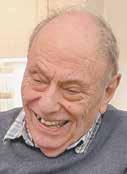
MEMORY OF ALAN WOLFF
“Stacy and family, condolences for your loss”
-Bethe & Gary Growe -
We’re proud to serve the friends and families of our Jewish community with personal, compassionate care. You can rely on us to help you create a meaningful memorial that truly honors the life it represents.
MORRIS L. SCHEER passed away peacefully on Sunday, May 28, 2023, surrounded by his family.
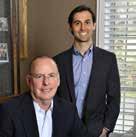
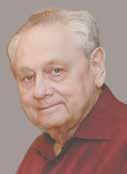
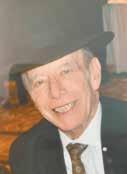
Son of the late Joseph and Bessie Scheer. Beloved husband of the late Neta Scheer. Dear father of Cynthia (David) Picker, Eddie (Brandy) Scheer and Jeffery (Irena) Scheer. Loving grandfather of Marc and Ryan (Gina Bommarito) Picker, Lisa (Spencer) Oloteo , Brad and Jessica Scheer and Nava and Nathan Scheer. Cherished great grandfather of Ryley Picker, McKinley, Sullivan and soon to be born Kaden Oloteo. Admired uncle, cousin and friend.
A graduate from Washington University St. Louis with a master’s degree in engineering, Morris served as an engineer in the United States Army. He went on to work at McDonnell Douglas in St. Louis where he became an integral part and leader in the NASA space program. Skylab, Gemini and Apollo were some of the missions he worked on during his tenure. After being honored for 25 years of dedication to that company, Morris went on to work for Sverdrup Corporation as an electrical and instrumentational team leader where he designed Miller brewery systems and worked on Hershey’s, Eli Lilly and Baxter Healthcare projects.
Morris was also proficient at electrical wiring, plumbing work, drywall, painting, flooring and working on his own car. He was an outstanding all-around handyman. He coached little league, was an incredible pine-wood-derby car partner for his boys and grandsons when they were in scouts, loved travel, model trains, rockets and airplanes, stamp collecting, intricate 3-d wood and metal puzzles/models, and Cardinal’s baseball.
A graveside service was held Tuesday, May 30 at Chesed Shel Emeth Cemetery, 650 White Road in Chesterfield. A Rindskopf-Roth Service
MARILYN B. SCHRAMM, June 3, 2023


Beloved wife of the late Norman Schramm; dear mother of Alan Schramm (Cindy), Bonnie Silverman (Jay), and Karen Schroeder (Dave); dear grandmother of Erin, Michael, Jacob (Alexandria), Sam (Brianna), Ryan (Ryan Burke) and the late Dana Gallo (late Anthony); dear great-grandmother of Graham, Foster, Nicholas, and Gianni; dear sister of the late Dolores Davis; dear aunt, cousin, and friend to many.
Visitation Monday, June 12 at 1 PM at BERGER
MEMORIAL CHAPEL, 9430 Olive Boulevard. Funeral service at 1:30 PM. Interment follows at United Hebrew Cemetery, 7855 Canton Avenue. Memorial contributions preferred to the Juvenile Diabetes Research Foundation (JDRF), 200 Vesey Street, 28th Floor, New York, NY 10281. Please visit bergermemorialchapel.com for Live Stream and other information. Berger Memorial Service
NOEL ALAN SIEGFRIED, June 5, 2023
Beloved son of the late Alvin and late Charlotte Siegfried; dear Step son of Helene Siegfried (Mike Barzoff), dear brother of Joseph (Leann) Siegfried and Penny (Rich) Baker; our dear brother, nephew, uncle, great uncle and cousin. We will miss him dearly.
A graveside service was held Tuesday June 6 at Beth Hamedrosh Hagodol Cemetery, 9125 Ladue Rd. Memorial contributions preferred to Independence Center (www.independencecenter.org) or NAMI (National Alliance on Mental Illness www.nami. org). Visit www.bergermemorialchapel.com for more information. Berger Memorial Service
Born January 6, 1940
Died June 2, 2023

Dear father of Elizabeth Spizman (John Ma), Marc Spizman (Julie Spizman), and Stacey Gerstberger (Jay Gerstberger). Dear grandfather of Elise Kozak, Rebekah McKenna, Gabrielle Ma, Natasha Ma, Davis Ma, Sophie Spizman, Adam Spizman, Carver Gerstberger, Tanner Gerstberger, Ridge Gerstberger, and Aspen Gerstberger.
Dear great-grandfather of James Kozak.
Dear son of Samuel and Shirley Spizman.
Brother of Victor Spizman and the late Marcia Sterns. Former spouse of Lois Greenberg Spizman. Special friend of Cindy Munchnik. Marty and his twin sister Marcia were born in Southfield, Michigan. He served our country in the United States Army. While he was stationed at Fort Leonard Wood, he met Lois Greenberg at Hillel in Columbia, Missouri, and they were married in 1960 and had three beautiful children.
Marty moved to St. Louis and founded Tile Town Carpet City with his father
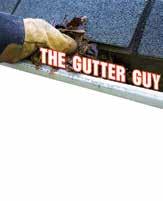
Samuel Spizman. Tile Town started as a small store in Bridgeton, Missouri. Marty, with the assistance of his brother-in-law Alan Greenberg, expanded the business to six stores, which became one of the largest flooring chains in the region.

Marty was a pillar within the Jewish community and a strong supporter of the Yeshiva in University City.

Marty immensely enjoyed teaching his children and grandchildren about Judaism. He loved playing chess with his grandson Adam, spending time with his family, and celebrating life with friends. Marty was an animal lover, treating his dogs like royalty. During his younger
years, Marty enjoyed riding on his Harley Davidson motorcycle and deep-sea fishing. Marty Spizman will be greatly missed by his family, friends, the Jewish community of St. Louis, and all who knew him.
A graveside service was held Sunday, June 4, 2023 at Chesed Shel Emeth Cemetery, 650 White Road in Chesterfield. Memorial contributions may be directed to Agudas Israel of St. Louis, 8202 Delmar Blvd, St. Louis, Missouri 63124.


Please visit www.bergermemorialchapel.com for more information. Berger Memorial Service
BRET C. TAUBEN, June 2, 2023
Beloved husband of Janet R. Tauben; son of the late Sheldon and the late Claire Tauben; dear brother of Scott Tauben (Melodie) and Jamie Demsky (Howard); dear brother-in-law of Ken (Mary), Tim (Cindy) and Rob (Dainna)

Vance; dear uncle of Elizabeth, Alexandra, Lindsay, Dana, Sarah, Julia and Robert Jr. Dear cousin and friend to many.

A graveside service was scheduled for Wednesday, June 7 at New Mt. Sinai Cemetery, 8430 Gravois, 63123. Memorial contributions preferred to the Humane Society of Missouri, 1201 Macklind Avenue, 63110. Visit bergermemorialchapel.com for more information. Berger Memorial Service
CONTINUED FROM PAGE 13
because it weakens our ability to confront the dominant force fueling increased antisemitism in America: white supremacy According to the ADL, white supremacy is the greatest danger facing Jewish Americans. As President Biden said in his opening remarks when the National Strategy was unveiled: “Our intelligence agencies have determined that domestic terrorism rooted in white supremacy — including antisemitism — is the greatest terrorist threat to our Homeland today.”
“We can’t take on white supremacy, xenophobia, anti-LGBTQ hate, or any
form of hate without taking on the antisemitism that helps animate it,” says Amy Spitalnick, the CEO of the Jewish Council for Public Affairs and former head of Integrity First for America, which successfully sued the neo-Nazis who organized the deadly 2017 Charlottesville march. “And likewise, we can’t take on antisemitism without taking on white supremacy or these other forms of hate … All our fates are intertwined.”
But Israel’s policies create a dilemma. When many of our potential allies see Israel, they see a country that calls itself a democracy but enacts laws enshrining Jewish dominance over Palestinian citizens of Israel. And they see a country that
has denied fundamental human rights to Palestinians in the West Bank and Gaza for 56 years. So, not surprisingly, they are moved to speak out about these realities.
Criticism of Israel will inevitably heighten in response to the policies and actions of this Israeli government. Some of Israel’s critics may indeed cross a line by using antisemitic tropes or stereotypes or denying Jews the same rights afforded to others, including Palestinians. When they do, they should not get a free pass. Full stop.
But we must resist the temptation to reflexively respond with accusations of Jew-hatred, even when the criticism of Israel is off-base or unjustified. We can-
not afford to oversimplify complex issues by conflating political disagreements about Israel with antisemitism. If we do, we risk distracting from addressing the most dangerous instances of antisemitism and bigotry.
Times like these call on us to shed the weight of our past and approach these issues with clear minds and thoughtful consideration. “Sometimes we split the world into good and bad to guard ourselves against difficult realities,” my mother said. “If we can rid ourselves of the bad and make it so the other side is always guilty, then we feel safe. But by doing so, we lose the ability to find a solution.”

